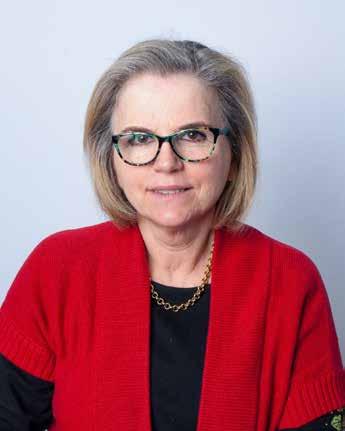MODUS VIVENDI
A Way of Life
COMMENCEMENT 2023
FACULTY PROFILE: JENNY SHIMADA

BEAR CREEK’S PRESENTATION OF LERNER AND LOEWE’S MY FAIR LADY
THE BEAR CREEK SCHOOL
MAGAZINE SUMMER 2023

COMMENCEMENT 2023
FACULTY PROFILE: JENNY SHIMADA

BEAR CREEK’S PRESENTATION OF LERNER AND LOEWE’S MY FAIR LADY
THE BEAR CREEK SCHOOL
MAGAZINE SUMMER 2023
Summer 2023
Modus Vivendi is translated as a way of life or a manner of living. The Bear Creek School seeks to develop individuals for whom the classical ideals of excellence in all things, love of learning, spiritual commitment, and self-discipline have become a way of life.
Art Director: Marla Blue
Copy Editor: Sini Fernandez
Photo Editor: Janeen Sorensen
Editors/Proofers: Jill Brown, JoDee Ramirez, and Elisa Watkins
Articles, photographs, and ideas are welcome and may be sent to modusvivendi@tbcs.org. We reserve the right to edit submissions for length, clarity, and style.
Morgan Abbott ’23, Patrick Carruth, Alan Geistfeld ’23, Phil Higley, Whitney Isbell ’15, Morgan Jamieson, Brady Parker ’23, Nathan Pettit, JoDee Ramirez, Ryan Summers, Andrew Tang ’23, Katrina Thomas, Dave Urban, Tracy Whitfield, and Jingyi Zhao ’23
Modus Vivendi is published twice a year by The Bear Creek School. If you are interested in writing for Modus Vivendi or have comments or questions regarding the publication, please contact us at modusvivendi@tbcs.org.
The mission of The Bear Creek School is to provide a high-quality, Christian liberal arts education in a nurturing environment that will enable each student to become the individual God intends.
Patrick Carruth
Andrea Lairson, Chair
Fileno Alleva, Vice Chair
Curtis Kraft, Treasurer
Kristine Shields, Secretary
Kurt Maass
Susan Diamond
Patrick Carruth
William Bieber
Kevin Keith
Jodi Hallum
Vivian Hom
Only online can you find the latest news, photos, and information about upcoming events. We’re here, 24/7.
tbcs.org
facebook.com/ TheBearCreekSchool
To get text or email reminders for upcoming events, athletics team events, and special programs, sign up for alerts at tbcs.org. Click on the “bell” icon next to any upcoming event on the school’s website calendar to sign up for an alert for that event.
For an in-depth view into the happenings at Bear Creek, read our blog at tbcs.org/blog. To receive alerts when new articles are posted, subscribe to the blog by clicking the “bell” icon at the top of the page.
Each Friday during the school year, The Bear Facts, Bear Creek’s weekly newsletter, is emailed to current parents, faculty, and staff. The Bear Facts contains news and announcements from each of the school’s divisions and from the athletics department.
Students, parents, faculty, and staff can find a complete list of role-specific resources on our website. See MyBC at the top of any page on tbcs.org and log in.
The Bear Creek School Facebook page contains current photos and posts about what is happening at Bear Creek. Bear Creek Preschool also has a Facebook page, and The Bear Creek School Alumni and Parents of Alumni have groups. Like us and join the conversation!
Visit
to
Grade 2 student Elissa Xia receives a Growing in Virtue Award for creativity during Lower School Chapel. See pages 24 – 25 to learn more about how we teach compassion and celebrate virtues in Lower School. Photo by Janeen Sorensen.
Learn more about Jenny Shimada.
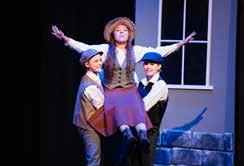
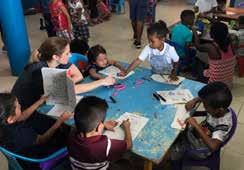
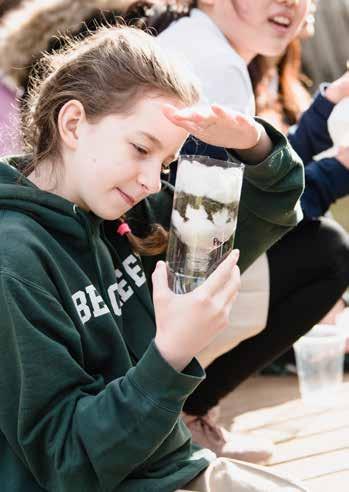
Pages 20 – 23 MY
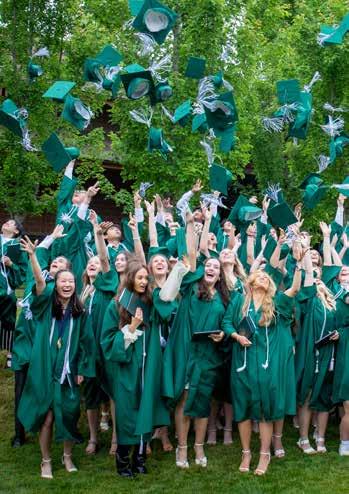
Page 32 – 35
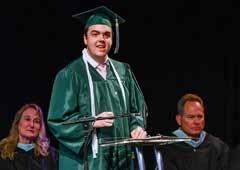
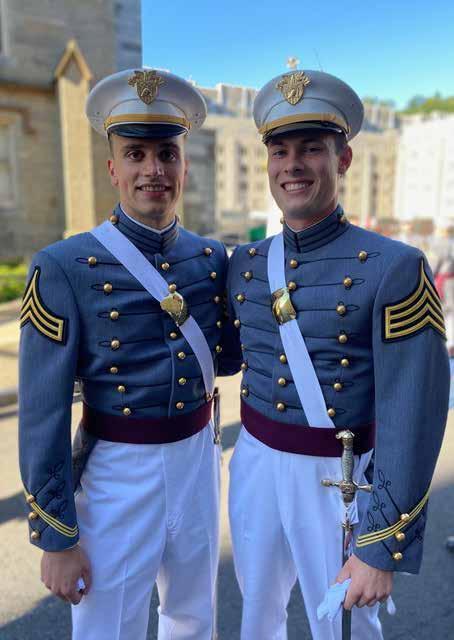
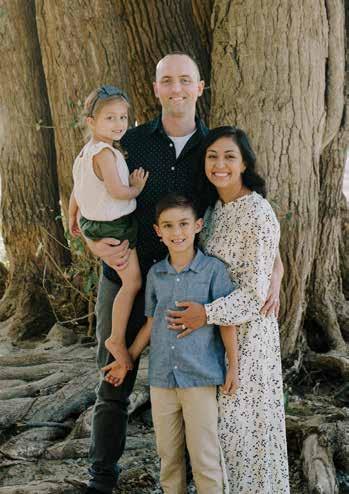
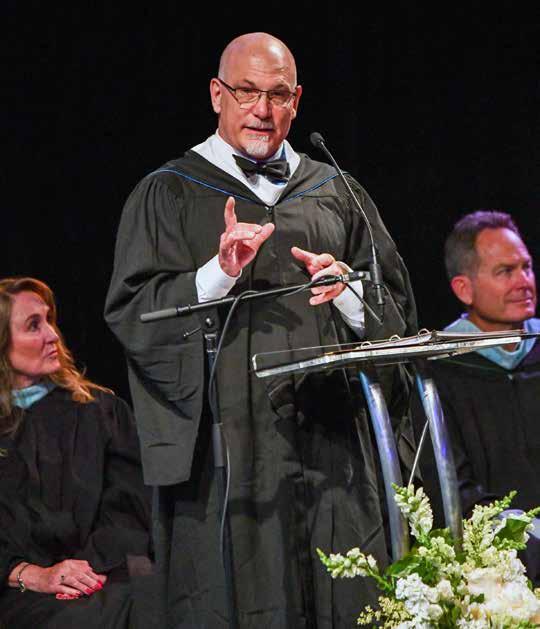 By Patrick Carruth
By Patrick Carruth
THIS MORNING, I was in a hurry and asked the refrigerator to prompt the Alexa to purchase some more milk, start the Tesla, and turn off all the house lights. After voicing the address of the church and asking the Tesla to drive, I glanced at my phone and asked ChatGPT to compose…
Okay, I don’t own a Tesla (though I rented one recently, and those things accelerate) and that story never really happened, but we all know that scene right out of the Jetsons (students, you don’t know what that is, but your parents do, don’t you?) is completely feasible today. But I did ask ChatGPT to write something for me, specifically, to create a commencement speech for the Class of 2023 which honored the mission of The Bear Creek School in Redmond, WA. Here’s what it came up with:
Hello, Class of 2023! Congratulations on your graduation! You have made it through a challenging and
rewarding journey at The Bear Creek School, where you have received a highquality, Christian liberal arts education that will enable you to become the individuals God intends.
You have learned to reason, judge, and discern through the studies of language, philosophy, history, literature, abstract science, and mathematics. You have also developed your talents and passions in STEM, the arts, and the humanities. You have grown in wisdom, compassion, and courage as you have engaged with the world from a Christian worldview.
But your journey is not over yet. As you leave this nurturing environment and enter the next phase of your life, you will face new challenges and opportunities. You will need to apply what you have learned here to make a positive difference in the world. You will need to continue to seek God’s will and purpose for your life.
You are not alone in this journey. You have a community of teachers, parents, friends, and alumni who support
you and pray for you. You also have a God who loves you and guides you. Remember the mission of The Bear Creek School: to provide a high-quality, Christian liberal arts education in a nurturing environment that will enable each student to become the individual God intends. That mission does not end today. It continues for the rest of your life.
So go forth with confidence and joy. Celebrate your achievements and look forward to your future. You are the Class of 2023, and you are ready to shine! Thank you.
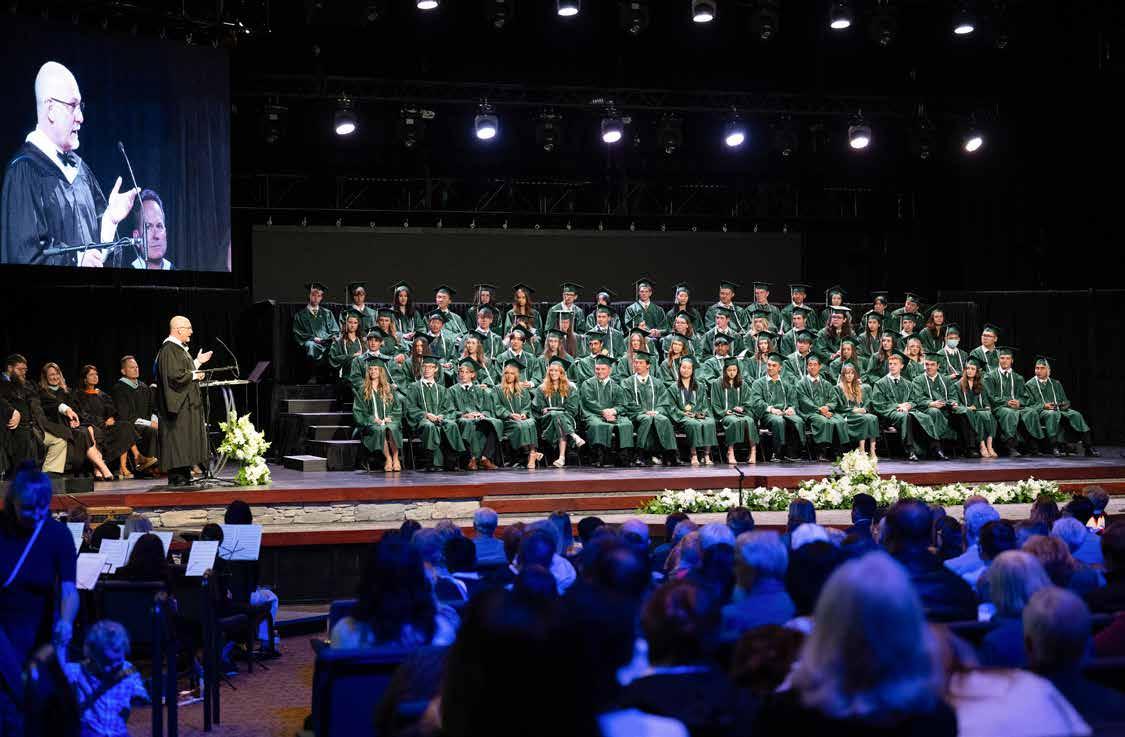
Then I asked it to add more humor. It added one line at the end, “and you are ready to shine, and in shine I mean shine like the nuclear fusion of the sun and that’s pretty bright.”
Well, what do you think? It hit all the buzzwords!
“High-quality, Christian liberal arts education” check; “individual God intends” check; “Christian worldview”
check; “Wisdom, Compassion, and Courage” check, check, check.
But stop and think for a minute about that exercise and my anecdote. That is the world you are entering. That is the time you will shape.
A time when nano- and biotechnology promises to cure and prevent illness and minimize human suffering. A time when agri-technology undertakes eliminating hunger and famine. A time when AI and VR may liberate humans from menial tasks and free them to pursue human flourishing. A time when genes can be manipulated to create “perfect” designer babies. A time when millions of people can be destroyed with the click of a mouse. A time when the word “humanity” may not mean anything at all. Some have called it the beginning of the exponential age. Some have called it the dawn of a new golden age. And some have said it will be the dawn of transhumanism and the end of the imago Dei.
You will navigate configuring a world where the question “What can I do?” is irrelevant and the question “What should I do?” is never more consequential.
It is our deep and abiding hope that what you have learned, seen, and heard in your time here at The Bear Creek School has prepared you to mold that world well. Not just the content of your subjects, but also their origin and purpose in the author of all things, the maker of heaven and earth, of all things visible and invisible. We also hope you:
You are the loving workmanship of the God of all creation, who spoke you into existence by the power of His word and who sustains you each day by His grace and mercy. You have been made in His image with inherent value, worth, and dignity.
In Weight of Glory, C.S. Lewis expresses it this way: It’s a serious thing, to live in a society of possible gods and goddesses, to remember that the dullest and most uninteresting person you can talk to may one day be a creature which, if you saw it now, you would be strongly tempted to worship... You have never talked to a mere mortal. Nations, cultures, arts, civilisations—these are mortal, and their life is to ours as the life of a gnat. But it is immortals whom we joke with, work with, marry, snub, and exploit—immortal horrors or everlasting splendours... Next to the Blessed Sacrament itself, your neighbour is the holiest object presented to your senses.
You will recall in The Lord of the Rings, Frodo Baggins laments the ring coming to him and the difficulty of the journey to destroy it, saying, “I wish it need not have happened in my time,” and Gandalf responds, “So do I, and so do all who live to see such times. But that is not for them to decide. All we have to decide
is what to do with the time that is given us.” By the Lord’s sovereign design, you have been placed here for such a time as this, to engage this exponential age with wisdom, compassion, and courage.
In an interview with Sebastian for his senior project, he asked me and others about how to be successful. I replied, “Well, that depends on your definition. And I suppose my definition could be summed up in the first question of the Westminster catechism: What is man’s chief end? To glorify God and to enjoy Him forever.” That is why you are. It is your purpose. The apostle Paul tells us in a doxology at the end of Romans:
Oh, the depth of the riches of the wisdom and knowledge of God! How unsearchable his judgments, and his paths beyond tracing out!
“Who has known the mind of the Lord? Or who has been his counselor?”
“Who has ever given to God, that God should repay them?” For from him and through him and for him are all things. To him be the glory forever! Amen
ChatGPT said in its speech that you are “ready to shine.” And so you are. But, before we go, let us augment artificial intelligence with the reality of the “one who is, and who was, and who is to come.”
(Revelation 1:8)
Graduates, you are ready to shine. “Let your light so shine before men, that they may see your good works, and glorify your Father which is in heaven.”
(Matthew 5:16)
We love you, and you are ready. Congratulations Class of 2023!
Morgan Joy Abbott‡*** Northwest University
Nathan Acheson** University of California - Irvine
Samuel Christopher Bieber‡ Gonzaga University
Annika Reese Boeh* Clemson University
Rebecca Elizabeth Brandt*** Brigham Young University
John Michael Braukus* Baylor University
David Joseph Joshua Brownell*** University of Washington
Yuet Ki Cheung*** Scripps College
Hannah Kathleen Chinn*** Carnegie Mellon University
Alexander James Takemoto Clark‡* Pepperdine University
Giap Thien Do* Santa Clara University
Irina Dudetsky* Seattle Pacific University
Tyler K. Ellington* Washington State University
Alan James Geistfeld*** California Polytechnic State University - San Luis Obispo
Payton Neeley Gergen*** University of Virginia
Peter Thomas Gilchrist*** Hillsdale College
Sebastian Gomez** Washington University in St. Louis
Owen Johnson Graves* Colorado College
Lana Hassan* Seattle University
Kendall Grace Huberty‡*** University of Washington
Zachary J. Hur* Pepperdine University
Elizabeth Hutchings*** Brigham Young University
Adian Scott Jackson Western Washington University
Jaeden Taylor Jensen*** University of Washington
Isabel Anh Jones‡*** Regis University
Rohan Varma H. Kanumuri** Gonzaga University
Ella Rose Katz‡** Pepperdine University
Taesung Kim*** Carleton College
Sophie Marie Kosted** Biola University
Abigail Anne Leinweber Bellevue College
Julianna Isabel Lemelson‡* Baylor University
Andrew Lin** Purdue University
Yi Luo** Ohio State University
Beatrice Manu** Purdue University
Mackenzie Reilly Martin*** Fordham University
Zachary Zheng Miyazaki*** Baylor University
Jakob Austin Morris*** University of Washington
Alexandra Olivia Negrila** Pepperdine University
Rosalind Kay Nordberg‡*** Whitworth University
Caleb John O’Gara‡*** Iowa State University
Clara Olivia Ogus*** University of California - Davis
Ana Karelys Paramo‡*** University of Oregon
Brady Coverdale Parker‡*** Baylor University
Isabella Corrine Rice** University of Washington
William Rosu** Baylor University
Levi Mark Schnarre‡ Pacific Lutheran University
Miya Anne Shimada‡*** Baylor University
Nathan Ted Smetters* Baylor University
Jacqueline Soloveychik** Wesleyan University
Paul Aidan Sorensen‡ Grand Canyon University
Peter Starovoitov Western Washington University
Grace H. Sun*** Belmont University
Zehao (Andrew) Tang** Baylor University
Danika Carmel Thompson*** University of WashingtonBothell
Serena Anne Town* Bard College
Jameson Weed‡* Northwest University
Catherine Wei** University of Washington
McKennon Gentry Wimer University of Utah
Anyu Yang* Purdue University
Jack Yang** Emory University
Alexander Yekhanin* University of North Dakota
Christian Joshua Yeo Whitworth University
Jingyi Zhao*** University of Pennsylvania
Chloe Zheng* Western Washington University
Xiangyu John Zhou Bellevue College
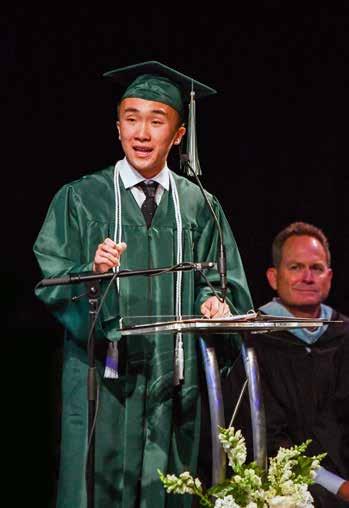 Photos by Sini Fernandez and Cindy McCahill
Andrew Tang
Photos by Sini Fernandez and Cindy McCahill
Andrew Tang
Please remain seated with your seat belt fastened and keep the aisles clear until we are parked at the gate. Flight BC2023, we’ve arrived at our final destination. You may be like Mr. Summers on a real airplane, wanting to get off as soon as possible because he thinks travelling is miserable. Or you may be like me, shedding a few tears as we land. Either way, we must disembark this aircraft today.
Seeing Bear Creek’s mission statement in big silver letters in the Upper School’s Nagel Commons every day since freshman orientation and hearing it from every school administrator again and again at first seemed to be just an advertisement, a marketing strategy just like any other brand’s or company’s. But during my time here, I realized that it is not an advertisement. Rather, it is modus vivendi—it is a way of life, as the title of our school magazine states. With God’s help, administrators, faculty, staff, parents, and students are all striving to carry out the mission. I came to understand that Bear Creek is not merely its rigorous academic curriculum. Teachers are not only academic instructors here to make a living, but they are also, more importantly, our mentors and friends. They care about who we are and what we do outside of school. They care about our spiritual and relational well-being.
Flight BC2023, we’ve experienced heavy turbulence, but it has not reduced the amenities in this aircraft. Rather, those turbulences, such as the COVID-19 pandemic, have made a tremendous impact on how we value our time with one another. The enthusiasm and unity of this class today is nothing that I could’ve imagined when I walked into freshman orientation four years ago. I’ll miss having friendly debates with my friends to discover what is good, true, and beautiful. I’ll miss seeing this senior class spending time with kindergarten students. I’m excited to see what God has planned for each one of you in the future. Let us remember how we have been blessed by this community. Remember how we have been challenged by this community. Remember how we have been transformed by this community. Congratulations, and thank you, Class of 2023!
The 100th day of school was a big deal in kindergarten. To celebrate, Mrs. Matson instructed each of us to bring in one hundred items. I brought in 100 rocks that I grabbed from my backyard the night before. I brought possibly the most boring object imaginable. Still, the 100day celebration was a big deal to little me. But that celebration does not even compare to the 2,314-day celebration, known as our graduation.
Our senior class is a beautiful representation of a strong community made up of phenomenal individuals. I never could have asked for a better group of classmates.
Each senior contributed a unique characteristic to our community. We will never forget Sebastian’s constant sports commentary, the drawings Chloe posted, Zach’s philosophical questions, Annika’s impeccable outfits, Levi’s tank references, Ros’ gentle character, Rebecca’s giggles, Jaeden’s joy, Alan being the GOAT, and how Miya basically led the class. Brady, thank you for getting us through stats! Caleb, thank you for being my boyfriend, and Grace, thank you for always praying for us.
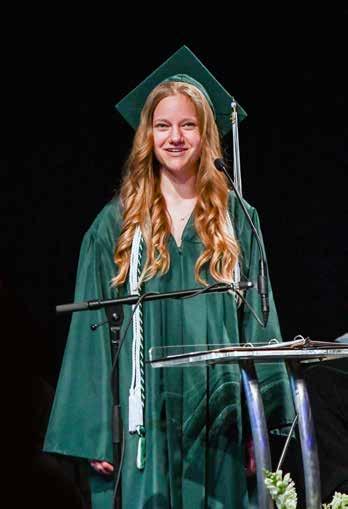
Teachers, you were the other core aspect of our community. Mrs. Matson, your gentle spirit always made the kindergarten classroom a warm place we wanted to be. Mrs. Whitlock, your contagious laugh taught me what joy is. Mr. Strobel, your history class was hilarious, even when it was supposed to be serious. Mrs. White, I always appreciated how seriously you took school. It is because of you that many of us actually know how to write in-text citations. Ms. Huston, thank you for not only sharing the gift of music with us, but for setting a Godly example of genuine gentleness and kindness. Mrs. Dunn, you challenged my capabilities, pushing me to do more than the minimum. Mr. Summers, the discussions we had in your class were the most enlightening discussions I had during my whole time at Bear Creek. Dear teachers, we are grateful for the challenges you presented to help discipline us. And we are also grateful for your tender guidance because it has helped us develop into the individuals God intends.
This fall, we will be walking through the doors of unfamiliar colleges and universities. We do not need to be afraid of the unknown. God is with us, so who can stand against us? Bear Creek has enabled us to seek courage. So be bold, strong, and courageous!
Congratulations to the Class of 2023.
What I want to do more than anything in my life is to model the wonder and beauty that Bear Creek teachers have been instilling in us for years. Their love for learning has imprinted upon all of us in unforgettable ways. Mrs. Thompson has taught our class the beauty of music for almost eight years now; I would not be the same person today if I had never discovered jazz or reveled in marches. Mrs. Dunn’s Marine Biology class reinforced tenfold my love of nature, something which I want to take with me on my intended architecture path through environmentally friendly designs. Dr. Sorensen’s love of Martin Luther inspires me to love something as much as he loves and learns from history. Mr. Dale, my fifthgrade teacher, was a particular inspiration to me, bringing me back into the Bear Creek community with open arms after I left for two years. Amongst my peers, Jameson finds his formula of love in Star Wars and theater, Nathan in psychology, Rebecca shows hers in singing, and Caleb in his knowledge of the weather. Every single one of them contributes to the great architectural monument, the cathedral of worship, that is Bear Creek.
No matter where our individual paths take us in the future, one thing is clear: our time at Bear Creek has fulfilled the school’s goal. We, each of us here today, are farther along on our paths to becoming the individuals God wants us to be. We are also at a point in our journeys to recognize that we are not fixed figures in time, but constantly changing, growing, learning individuals whom God will mold throughout our lives if we let Him. The musical this year was a perfect example of that. Six performances, each cast bringing its own life and interpretation. Though the structure was the same, the content changed and evolved, becoming more and more refined and beautiful in each subsequent performance. We emerged stronger and more beautiful because we saw firsthand that the beauty of humanity is not in its perfection but in the imperfect way we struggle to embrace and reflect the infinite perfection of our Creator. The bumps in the road, the knots in the wood, the bubbles in the glossy finish of our characters are the places where God shines through the most, and that knowledge is what gives us bold confidence as we take our next steps into each of our unique futures.
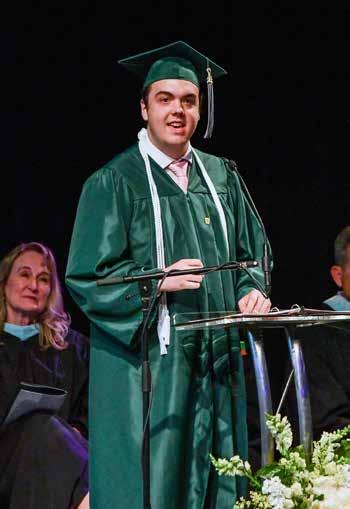
What are three things you know to be true? I’ll start. Number one, I know that cows hate country music. Two, I know that an icosikaidigon has 22 sides. And three, I know that a voice, at the right pitch, can start an avalanche.
Among the trillions of quirky (and nerdy) facts that I have learned as a Creeker, that last one might be worth our time to remember.
For the first 14 years of my life, I failed to find that pitch.
My journey of finding my voice began when Dr. Sorensen fished me out of escaping recess to read dictionaries in sixth grade and asked me, “What do you think about turning the books you read into scripts and performing them as speeches?” Just like that, I was offered the opportunity to participate in the Upper School forensics practices.
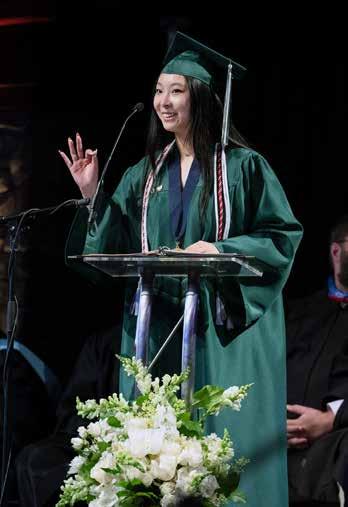
At first, I would find excuses every weekend to avoid competing, but I slowly saw the buds of my effort bloom in competition, and I began finding joy in coaching underclassmen and trying new events.
Another place dear to my heart was our AP Language and AP Literature classrooms. I want to thank Mr. Norris for being the first person who expressed curiosity about my research passions and Mr. Summers for giving me a place to not fear, but instead, dream abstractly. The beautiful thing about being a Bear Creek student is that we all have places we call home here.
And of course, my daily experience is undeniably shaped by the students around me, the Class of 2023. It’s the little dance Sebas does every time he consumes great food. It’s the Nike headbands Miya swore by every day until high school. It’s the candy dust David inhaled after stabbing smarties with an expo marker in front of Ms. Wilder. It’s the lifelong friends I’ve made. Not only did we survive and thrive together through a global pandemic, but we also came back with a heart for one another that grew upon its past strength. So, here’s another thing I know: Life will hit you in the face and wait for you to get back up just so it can sock you in the stomach. But getting the wind knocked out of you is the only way to remind your lungs how much they like the taste of air. Why? Because the air from your lungs makes your vocal cords vibrate, and that’s what makes a voice heard. Here, I’m grateful and proud to say that I’ve finally found my voice.
If the door to a heart seems closed, you should knock, or at least speak to it warmly in moments when words melt walls. If such barriers block every heart, teach those in front of doors numbered x to infinity how to speak too.
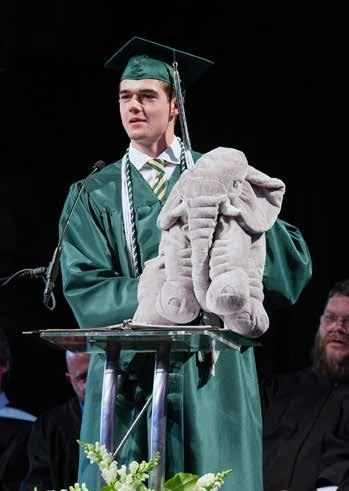
“…Wibbly wobbly waul, an elephant sat on Paul, wibbly wobbly wam, an elephant sat on Sam.” I learned the names of my closest lifelong friends through a song we sang in preschool with Mrs. Anderson. It was the beginning of a journey, one that would have ups and downs, one that would teach us of the tangible and of the transcendent, with a community of faculty and staff who have had a loving vision for us.
Kindergarten was where we learned the fundamentals. Ms. Carpenter taught us foundational Christian principles, like being kind, and foundational academic principles, like addition and subtraction. Little did we know, in 12 short years we would be wrestling with moral arguments for the existence of God with Mr. Urban and finding derivatives using limit definition with Mr. Culbertson.
“I am a C, I am a C-H, I am a C-H-R-I-S-T-I-A-N, yeehaw, and I have C-H-R-I-S-T in my H-E-A-R-T and I will L-O-V-E E-T-E-R-N-A-L-L-Y.” Lower School Chapel is where my love for the Lord was first able to flourish. Songs ran through my head all day long after Chapel, a constant reminder of God’s love, promises, and blessings that are so simply and beautifully portrayed in children’s worship songs.

In Mr. Hollis’ grade 4 classroom, there were songs for everything from the basis of our country’s government [sings Schoolhouse Rock Preamble song] to the water cycle to the fruits of the spirit to Shurley Grammar.
In Middle School, we began to encounter increasingly complex concepts like... “Mitosis, chromosomal ride, inter-, pro-, met-, ana-, telophase divide. Eukaryotes go from one cell to two, mitosis – how cells renew.” Mrs. Brown first introduced us to the polarizing mitosis song, either loved or hated, no middle ground. This is how we delved into the complexities of God’s creation, the unfathomable inner workings of the cells that make up our infinitely complex bodies.
Looking back on our years at Bear Creek, music stands out as a defining vessel for learning, fostered by music faculty like Mrs. Mauer, Ms. Huston, and Mrs. Thompson. As we depart, we passed down our class verse to this year’s kindergarteners, the Class of 2035, and a group of seniors put the verse into song. I’d like for us to sing it for you all in testament to the never-ending promise of God’s faithfulness throughout our lives.
(see left)
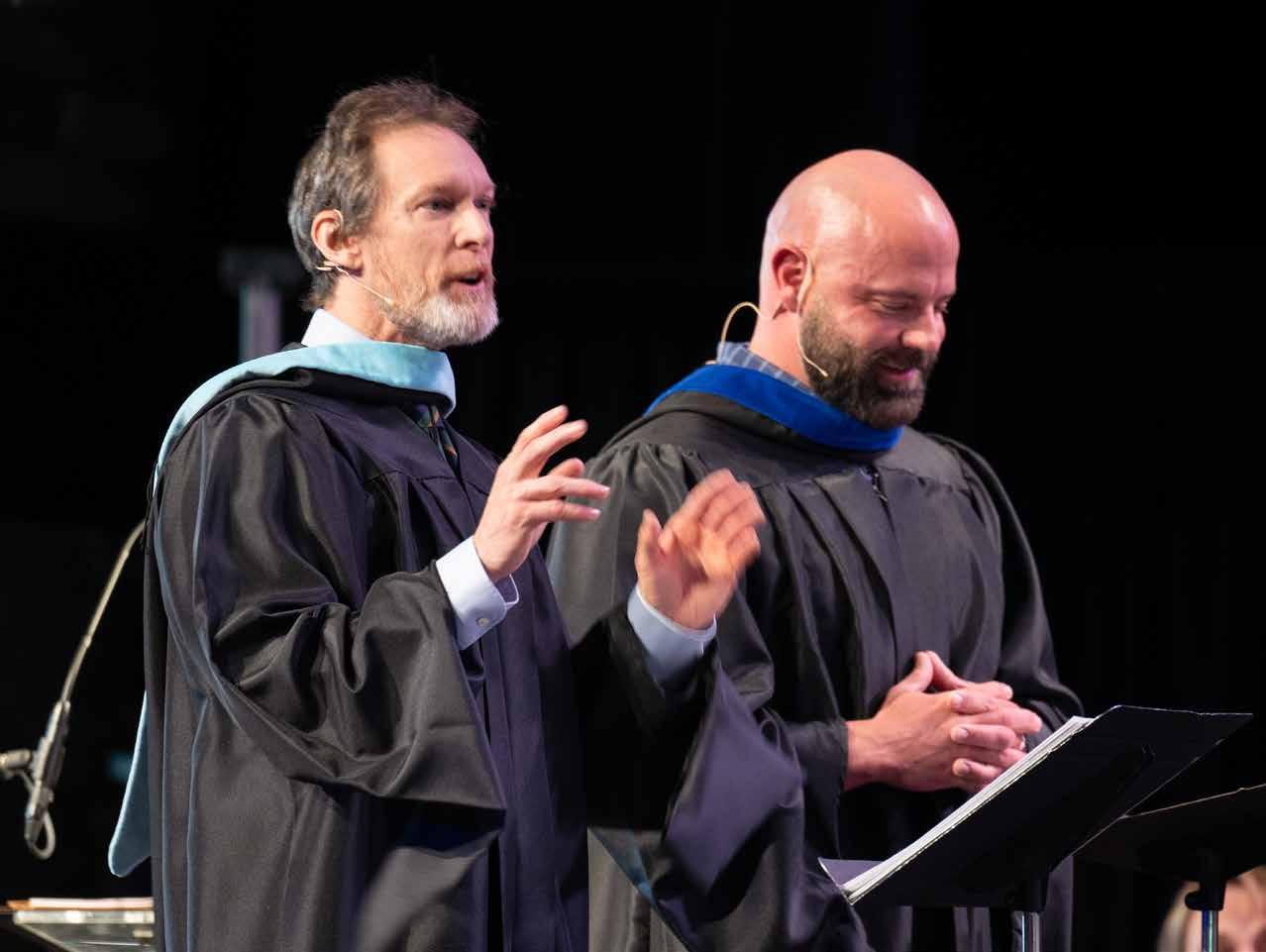 BY PHIL HIGLEY AND RYAN SUMMERS
BY PHIL HIGLEY AND RYAN SUMMERS
PHIL HIGLEY: “As you embark on this new journey after completing your studies, I want to reflect on the importance of seeking the future. The future is not something that simply happens to us; it is something we create. It is up to each of us to determine the direction in which we want our lives and the world around us to go.”1
RYAN SUMMERS: Mr. Higley?
PHIL: “But seeking the future is not always an easy task. It requires us to embrace the unknown. It means being open to new experiences, ideas, and perspectives.”2
RYAN: Huh? Phil?!
PHIL: “Seeking the future requires us to let go of the past.”
RYAN: Someone, help! Phil?!
PHIL: OK, OK, I’m just kidding.
RYAN: Oh man, you scared me. I mean you sounded like some AI version of yourself. If all 240 pounds of you wasn’t here right now, I’d have thought you were a robot. This is your body, isn’t it? [tapping on Phil’s bicep]
PHIL: Don’t worry; it’s me. I typed “write a graduation speech” into ChatGPT and that was the first paragraph it kicked out.
RYAN: Yeah, that sounded like something a robot would say.
PHIL: Well, pretty soon, Summers, we’re gonna see some human looking AI units. You’ll be able to buy an omniscient personal assistant, one who’s much easier to get along with than a real person.
RYAN: We have selfdriving cars, so, wow, I guess these robots could actually walk around and simulate human behaviors?
PHIL: You might not be able to tell the difference between the real humans and the AI “humans.”
RYAN: Geeze, Higley, what if next year one of them [pointing at graduates] starts dating someone and it turned out to be one of those AI units?!
PHIL: Maybe we should write a little book: How to Tell If You Are Dating a Robot, dedicated to The Bear Creek School Seniors, Class of 2023, the best Bear Creek class in the school’s history.
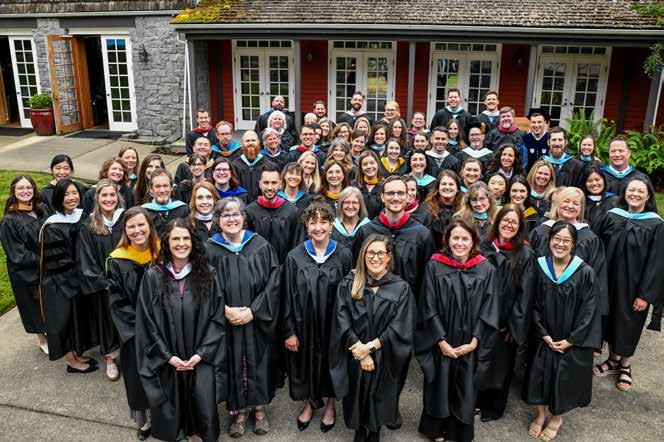
RYAN: I don’t think we should say “the best Bear Creek class in the school’s history.” Even if we did think it were true, that might be a bit…indelicate. But I like the book idea. What is the difference between a robot and a real person? What makes us human?
PHIL: Well, anthropology is a broad field, but from a Christian perspective we have Jesus at the center of what it means to be genuinely human. The radicality of the message of Jesus turned the Roman world upside down, or right side up, and the message of Jesus has been challenging humanity to continually reassess what it means to be human, what it means to love, what it means to see one another with dignity despite our differences. As St. Paul says, Jesus is the image of the invisible God. We are made in that image.
RYAN: So, Jesus is the exemplar of full humanity. And we grow into our humanity as we become more and more like Him. Robots aren’t the image of God any more than, say, Frankenstein’s monster was. Only God makes things from nothing; we just make things from things. And those things aren’t imbued with the breath of life that only God can give. We’re collectors, not creators. Sure, we could and likely will construct robots that resemble our human morphology, but surely that’s not the same thing as being made in the image of God, made to be like Christ. In fact, Victor’s monster calls himself the anti-Christ, meaning, ultimately, the anti-man. Dust cannot give life to dust.
PHIL: That’s great. How to Know If You Are Dating a Robot. Chapter 1: Anthropology. Chapter 2 could be Axiology, truth.
RYAN: Yes, morality. Are robots moral? One of my favorite archetypes we studied this year was Huxley’s portrayal of goodness with the character of John. I can hear someone objecting: John is pretty far from morally perfect. I’d have to reply, “yes, exactly.” To be good, we must be free. And if we are free, then beings with limitations will inevitably err, physically, intellectually, morally. That’s why John, in order to represent goodness, must have come from outside the World State, so that he is not a product of biological engineering or social conditioning. As Mustafa Mond says,
those within the World State are so conditioned that they can’t help doing what they ought to do—they’re basically pleasure robots.
PHIL: Their actions can’t be described as good if they are engineered. They aren’t really moral or immoral.
RYAN: Right, the World Controller says the matter of Goodness is irrelevant because the citizens are programmed to love comfort, ease, and safety. And here is a highlight of Honors Senior English for Sebas3: John courageously rebuffs the easy life of social conditioning, shouting: “I don’t want comfort. I want God, I want poetry, I want real danger, I want freedom, I want sin, I want Goodness.”4 John was so human in that moment— he could be actually good because he could be actually bad, and he ended up being both. Because his behavior wasn’t programmed, he was perhaps the only character in the novel who did anything moral or immoral.
PHIL: So, if Sebas were dating a robot, it wouldn’t actually have a will because it would merely be operating on algorithms and statistical patterns.
RYAN: Exactly. This robot girlfriend could generate relevant responses in a conversation, but without a will, she’s without morality. Would it matter if she told Sebas that she loved him? There is no She and no consciousness of Him. Or what if he came home and told her how hard his day was, and she sympathetically intoned some comforting words of encouragement. Would that mean anything? This girlfriend robot might have manners, but not kindness. Humans don’t execute operations which result from programming—we make conscious choices arising from personal agency which can, therefore, be good or evil.
PHIL: Right. She doesn’t love him. Because authentic love requires free humans in a reciprocal relationship. Chapter 3 should be about love. C.S. Lewis says that “All sorts of people are fond of repeating the Christian statement that
‘God is love.’ But they seem not to notice that the words ‘God is love’ have no real meaning unless God contains at least two persons. Love is something that one person has for another person. If God was a single person, then before the world was made, He was not love.”5 Lewis is speaking about the Trinity. True and authentic human love requires authentic human relationship. AI could mimic loving traits in a complex algorithmic pseudo-relationship, but is that good enough? If God is a triune loving relationship in His own ontology, His own being, and we’re created in His image, then we desire—whether we know it or not—to be in loving relationships with others. This is where anthropology gives rise to sociology, and both are undergirded by Trinitarian theology.
RYAN: So, humans seek love and relationship—it’s an inescapable part of the image of God in us. That’s why without love, we are without rest.
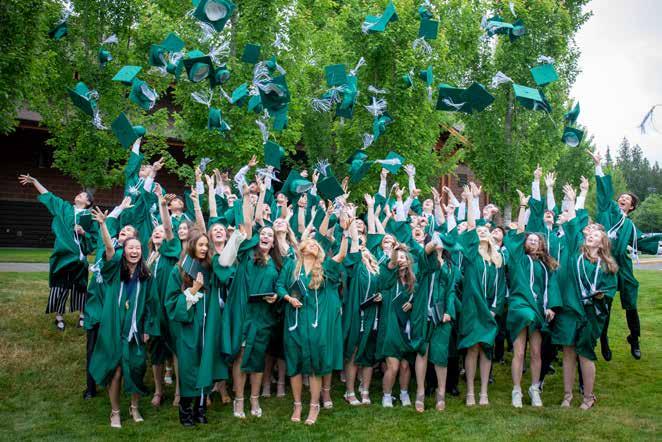
PHIL: St. Augustine said: “You have made us for yourself, O Lord, and our hearts are restless until they rest in You.” We desire to be loved; we desire to love. Give me all the materialism in the world without love, and I have nothing. While not addressing the possibility of dating robots, Augustine and Lewis point us to the reality that true humanity resides in God’s love for us and our love of God, and this translates to our love of one another; love is a truly human enterprise.
RYAN: So, Chapter 1, Anthropology: a robot partner could look human, but could never possess the image of God. Chapter 2, Axiology: a robot partner could offer advice or comfort but would lack the moral agency to be actually good. Chapter 3, Love: a robot partner could interact continually (as long as it was charged) but would never love a person seeking partnership.
PHIL: Good summary.
RYAN: Thanks.
PHIL: Which makes chapter 4…
RYAN: Chapter 4 should be about teleology, purpose. What seems clear the more we talk about this is that AI units aren’t really going to fool us into thinking they’re human. Perhaps we shouldn’t fear that robots will become too much like humans, but that humans will become too much like robots. For example, let’s say Clara6 went to college and started dating a robot: what if the question wasn’t whether or not she could tell, but whether or not she cared? What if she knew, but accepted or even preferred the robot.
PHIL: Well, college guys don’t exactly have the reputation of setting a high bar when it comes to virtuous teleology. It probably is easier to date a robot than a 19-year-old dude.
RYAN: Hmm…good point. The college frat house and the Brave New World have a few things in common.
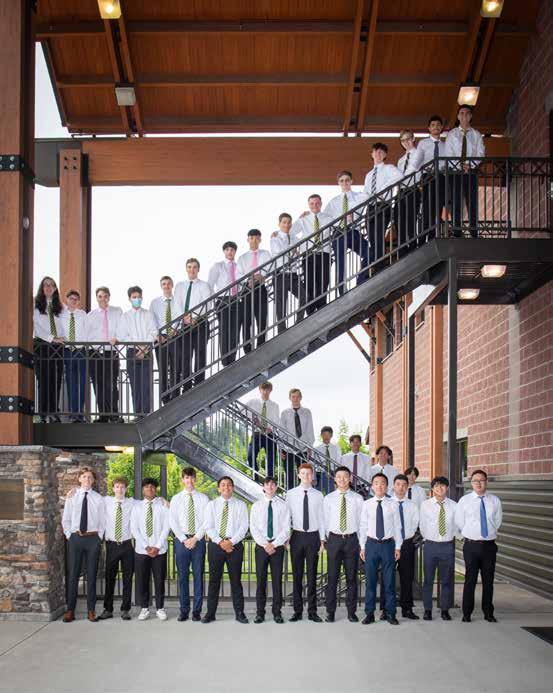
PHIL: But Clara would care if she realized her date was an AI unit.
RYAN: That’s true. We all ought to be people who care more about truth than efficiency and more about goodness than pleasure. So, in thinking of chapter 4 and teleology, this means we ought to always interrogate our desires with Why not just How. The existentialists we studied would never let us get away with merely settling procedure without pursuing reflection.
PHIL: Their famous phrase “existence precedes essence” is the starter there.
RYAN: Right. Sartre said that we humans turned up here and found ourselves with no script, no director, and no message. And so, our role, our character, our telos are whatever we make them—it’s all on us, which is why, he
says, we feel anxious and forlorn.
PHIL: Of course. If our existence is all an improv, well, that’s a lot of pressure.
RYAN: But if we are made by God, then we bear the traits and capacities of His image, and those traits and capacities shape our desires and abilities, which in turn reveal our purpose, our telos
PHIL: In that case, our essence is an endowment from God, not something we ad lib
RYAN: Good. How about an example: we have minds and so are made to think, and our capacity to think signals the existence of truth, and truth is an extension of God’s nature. Therefore, we, as beings in His image, fulfill part of our purpose by using our minds to apprehend truth, and we sense a satisfaction—instead of anxiety or forlornness—in doing so.
PHIL: And truth is different from binary code. Humans seek truth. Machines display “electronic traces of sets of binary correlates.”7 AI can’t think or assign meaning or understand ethics. It has no transcendent telos—it can only serve as a tool to those who assemble or program it. Humans aren’t tools because we do have a transcendent telos that comes with moral agency.
RYAN: So, if I instrumentalize someone, making them a means to my end, or forcing their end to be my end, I treat them like I would a robot. I can even instrumentalize myself, for example through workaholism.
PHIL: To instrumentalize is to dehumanize.
RYAN: Aristotle said, “True friends love each other, not merely what they can get out of each other.”8 A person and
a robot could never actually satisfy Aristotle’s vision of a virtue relationship because one of them is literally a tool.
PHIL: And another thing that separates people from tools is that you can put one of them in your Amazon cart. Kant says, “What has a price can be replaced by something else as its equivalent; what, on the other hand, is raised above all price and therefore admits of no equivalent, has dignity.”9 So people have intrinsic dignity, we are priceless and unique, which rules out treating one another or ourselves as a means to an end.
RYAN: Our lives—our time, talent, capacities, and longings—were made for connection with something transcendent, and if we use them merely as instruments of material achievement, then we have made ourselves tools and abandoned our true telos.
PHIL: I don’t think you have to be scared that Zach10 will end up dating a robot next year. The real concern would be that he meets someone who instrumentalizes him or instrumentalizes herself in the service of prestige, possessions, money, or status.
RYAN: Ah, right. The real threat here isn’t the proliferation of tech but the diminution of humanity. This is all coming together in my mind now. Anthropology: we’re made by God to be like God, like Christ, the archetype of full humanity.
PHIL: Axiology: because of our freedom and agency as God’s image bearers, we can be truly good or truly evil.
RYAN: Love: since the Trinitarian God is Himself love and He made us for Himself, we will be restless until we join in the dance of Father, Son, and Holy Spirit, finding in our neighbors other partners for this perichoresis.
PHIL: Teleology: our identity as priceless and unique children of God means that our purpose transcends the
material pursuits of this world. To instrumentalize ourselves or others is an act of dehumanization.
RYAN: All of this isn’t really about rejecting technology so much as guarding who we are as people made after Christ with moral responsibility, relational capacity, and transcendent purpose.
PHIL: So, I guess that means our upcoming bestseller How to Tell If You Are Dating a Robot doesn’t really need to be written.
RYAN: I’m afraid you’re right. We don’t need another new book on the dangers of technology; turns out, we just need to read the old ones about humanity: Shelley, Huxley…
PHIL: Lewis, Augustine…
RYAN: Sartre…
PHIL: Aristotle…
RYAN: Kant.
PHIL: That sounds like a high-quality, Christian liberal arts education which helps students become the people God intends.
RYAN: Now that’s good. Did you just come up with that?
2. Ibid.
4. Aldous Huxley. Brave New World, chapter 17. 1932.
5. C.S. Lewis, Mere Christianity: Beyond Personality, The Good Infection. 1952.
6. Clara Ogus, The Bear Creek School, graduating class of 2023
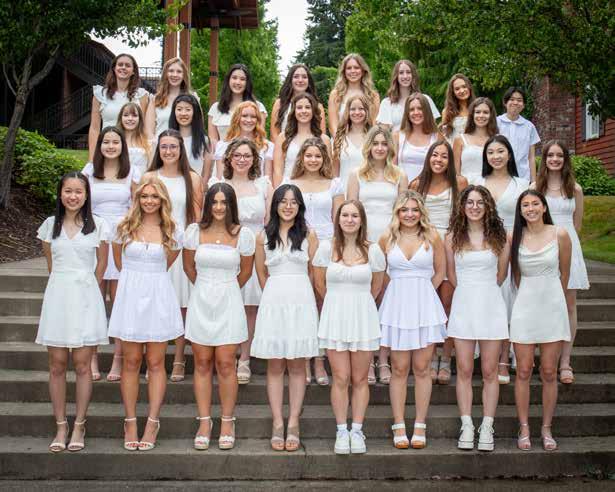
7. David Bentley Hart, The Experience of God: Being, Consciousness, Bliss. 2013.
8. Aristotle, Nicomachean Ethics, Book 8.
9. Kant, Groundwork, 4.434
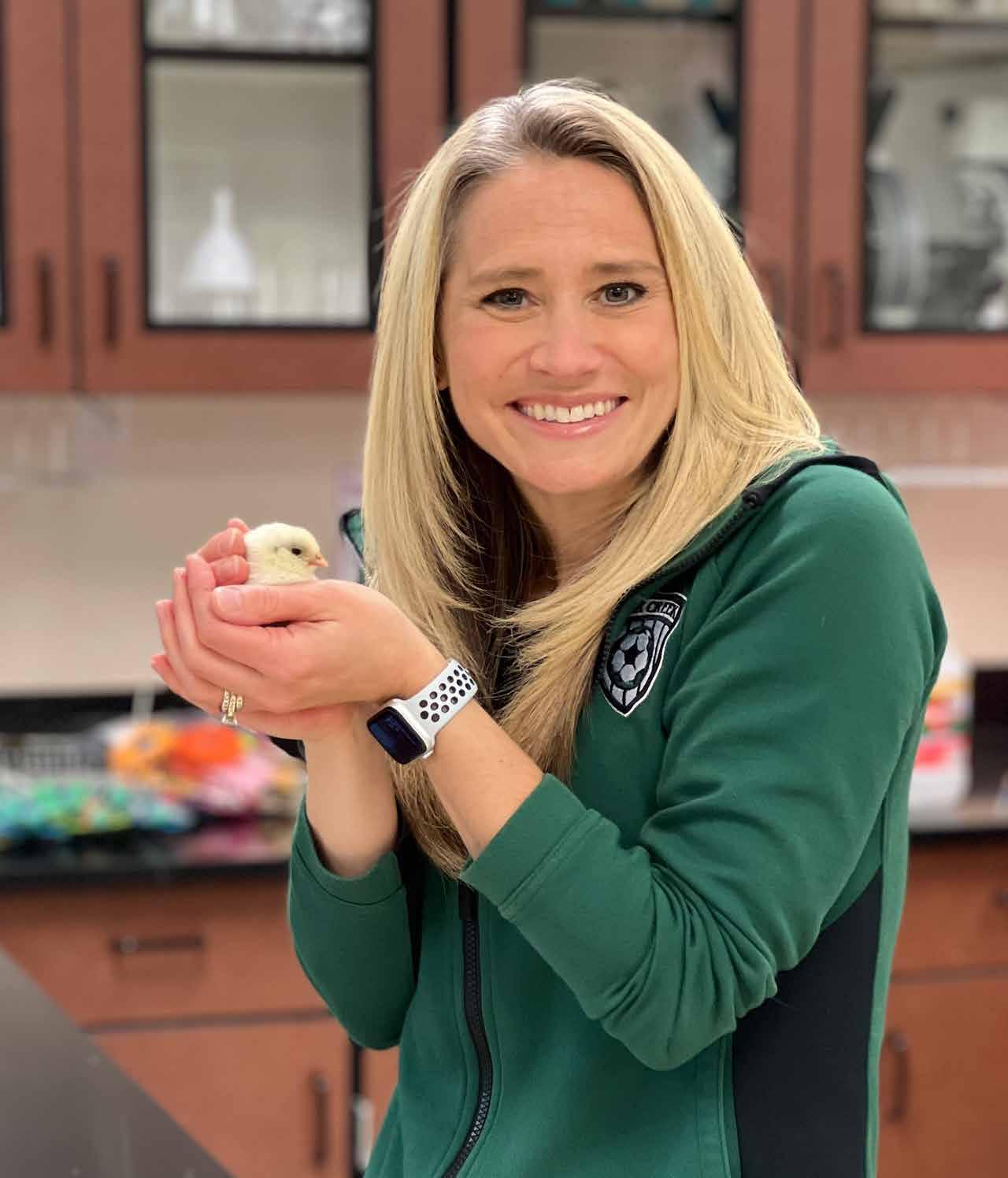 BY MORGAN JAMIESON
BY MORGAN JAMIESON
JENNY SHIMADA IS A BELOVED KINDERGARTEN and grade 1 teacher at Bear Creek who has been a fixture in our school’s community for over 20 years. Born in Seattle and raised in the cozy town of Snohomish, Jenny started her teaching journey at Bear Creek straight out of college.
Jenny attended Seattle Pacific University (SPU) from 1997 – 2001, where she studied sociology and elementary education. Initially uncertain about her future path, she knew that she wanted to be a mom. Teaching seemed like the perfect avenue to gain experience and skills to be the best mom she could be. Jenny quickly fell in love with teaching and recalls, “It just affirmed that God placed that desire in my heart.”
Jenny’s journey to Bear Creek was truly a blessing. In 2002, after completing her student teaching internship and obtaining her certification, she found herself graduating in the middle of the school year and began substituting for the Seattle School District. A friend from SPU’s education program had started working at a small school called The Bear Creek School and informed Jenny that Bear Creek was looking for a grade 1 teacher.
Jenny recalls her first phone interview with the school and speaking with Vice President for Academic Affairs Karen Blankenbeckler. “She was so sweet,” Jenny reminisces, “I remember thinking that if people at this school are anything like this loving and kind person, I definitely want to be there.”
Upon arriving at the school for the first

time, Jenny was amazed by the beautiful new building and the lovely people she encountered. During her interview, almost all the members of the Lower School team were present, including Founder and Head of School Nancy Price. Jenny reflects, “Looking back, I love to think, wow, I had the founder of the school at my interview. If I had realized that, I would have been a lot more nervous!”
“Everything worked out in a beautiful way,” she describes. “I love looking back and seeing God’s hand in it and how He had a plan for me from the very beginning.” Jenny has been happily married to her husband, Court, for 20 years now, and together they have two remarkable children who have both attended Bear Creek.
Her engagement and wedding became intertwined with the school in an endearing way. Just a few months into her teaching career, Jenny was invited to the upcoming school auction by the Gomulkiewicz family, whose daughter, Katie ’13, was in Jenny’s class. However, unbeknownst to Jenny, the evening of the western-themed school auction, held at the school, coincided with Court’s planned proposal.
Court secretly transformed Jenny’s classroom into a romantic setting complete with flowers, music, and special lighting. Tricking Jenny into leaving the auction, he
I LOVE LOOKING BACK AND SEEING GOD’S HAND IN IT AND HOW HE HAD A PLAN FOR ME FROM THE VERY BEGINNING.
guided her to her classroom where he proposed. When the auctioneer heard the news, he stopped the event to make a special announcement, which was met with huge congratulations from everyone. This marked the beginning of a special connection between Jenny’s personal milestones and the Bear Creek community.
“After that,” she recalls, “I couldn’t pass up the opportunity to have Bear Creek be a part of my wedding.” The news of Jenny’s engagement quickly spread. Faculty, staff, and classroom families hosted wedding showers, and everyone in the Bear Creek community was invited to attend their ceremony at University Presbyterian Church in Seattle. One of Jenny’s favorite memories of the day was seeing her grade 1 students and their families gathered in the church foyer celebrating with the happy couple.
“I have so many memories that have impacted who I am and who I became as a mom,” Jenny states. After her daughter and son were born, Jenny took a six-year hiatus from teaching, but she would often visit campus with her little ones in a backpack or stroller. She describes, “I loved sharing them with the community, and I knew someday I would have to return to have our children experience this place as students.” Jenny’s daughter, Miya ’23, recently graduated, while her son, Kobe ’24, is a senior this fall. “It is really special to be a part of a community that my kids experience day in and day out. This is their home; this is their family.” As her children conclude their time at Bear Creek, Jenny expresses deep gratitude to the faculty and staff who have poured love, support, wisdom, and inspiration into them over the years.
One memory holds a special place in Jenny’s heart. Miya, an avid soccer player, was unable to play on Bear Creek’s girls soccer team her senior year due to significant knee injuries. That year the team qualified for the State tournament. To celebrate the team’s achievement, the school organized a pep rally and created a celebratory tunnel for the players to run through on their way to the bus. Every Lower School student lined the halls, showing their support
by jumping and cheering. The air was filled with excitement.
Miya had re-injured herself just days before and as she made her way through the tunnel on crutches as the last person in line, Jenny’s students were overjoyed to be cheering for their teacher’s daughter. While the rest of the team had already reached the bus, Miya was still surrounded by the resounding support and excitement from all the students, faculty, and staff. They cheered not only for the team but also specifically for Miya. Despite her recent setback and the nearly year-long healing process, Jenny saw a radiant expression of joy on Miya’s face. “I will never forget how she was so happy despite her physical setback,” Jenny reminisces, “Witnessing my daughter hobbling down the hallway, enveloped by the love of all the people I love, a community she was born into, was an incredibly special moment for me as her mom, and everything came full circle.”
Something the Bear Creek community may not know about Jenny, is her experiences on two mission trips. During her college years, she lived in a Romanian orphanage for a summer with a group of six other students. The group dedicated their time to interacting with the children, organizing vacation Bible school activities with a local ministry,
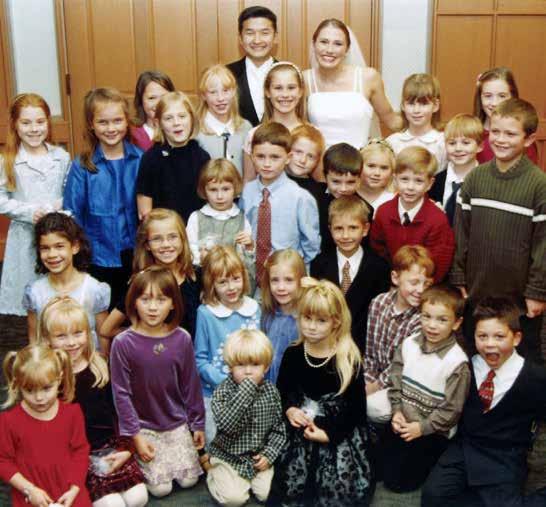
and assisting the kids in improving their English skills. Jenny and her group’s mission was simple yet powerful: to shower these children with love and attention.
Jenny’s favorite part, though difficult, was the time she spent at a baby clinic in Lasi, helping babies in need of care and affection. While there was a nurse attending to their physical needs, the babies lacked emotional support, with no one to hold them or show them love. Some of them didn’t even have names. Jenny reflects, “It tugged on my heartstrings very much…I really enjoyed having that physical contact with them and loving on them.” Jenny knows her experience was part of God’s plan for her life, as it planted seeds of compassion and purpose in her heart. “It was a really special experience that reinforced the goal of wanting to be a mom and shaped my decision to go into education.”
In 2019, Jenny and her family went on a mission trip with their church to Ecuador. They partnered with a ministry that organized activities for children. They engaged in games, skits, and shared Bible stories. They also had the opportunity to provide parenting education to families through a panel discussion. During their visit, they volunteered at a local private school helping with manual labor. When
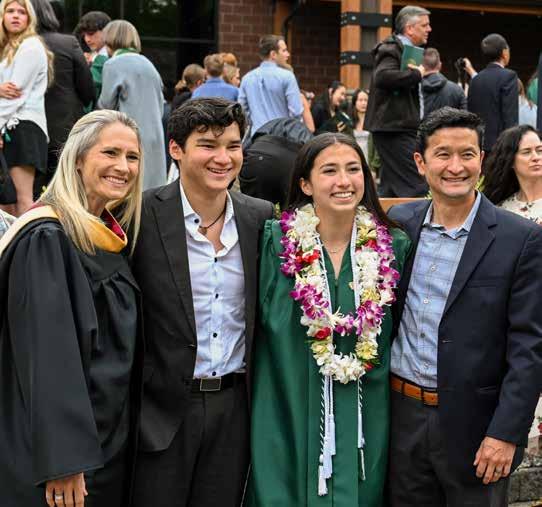
the school learned that Jenny was an educator, they were curious to get her insights on discipline. Jenny shared about Bear Creek and offered ways to guide their students with compassion by encouraging positive behavior, celebrating character, and embracing the virtues that God is growing in their hearts.
Outside of Bear Creek, Jenny enjoys spending time with her family, attending sporting events, musicals, and concerts. They also share a love for wake surfing and traveling to experience God’s creation together. Within her family, Jenny finds inspiration in her husband, whom she admires for his servant’s heart and dedication to their family. She looks up to her mother’s faithful courage through hardship, her daughter’s confidence and identity in the Lord, and her son’s adventurous and fun-loving approach to life.
Jenny expresses deep thanks to her friends and colleagues who have been constant sources of support and inspiration. She is grateful to Preschool Division Head Rachael Urban, who played a key role in her teaching journey and became a close friend as they navigated parenthood together. She holds a special place in her heart for former Bear Creek kindergarten teacher Pam Erickson and the kindergarten teaching team, valuing their genuine friendship and shared faith. Karen Blankenbeckler, who has supported Jenny since her early days at Bear Creek, continues to mentor her daughter Miya. “These amazing people have walked through life with me,” she says.
Looking back on her journey, Jenny reflects, “With blind faith, I stepped into that first interview. I didn’t know where it would lead, but God had something great in store for me.” Jenny has given so much to Bear Creek in return. Her journey, guided by her faith and compassionate heart, has shaped the lives of countless children, and embodies the spirit of community and love that defines Bear Creek. As a cherished friend, colleague, and teacher, Jenny Shimada is a blessing to our school and to all who have the privilege of knowing her.
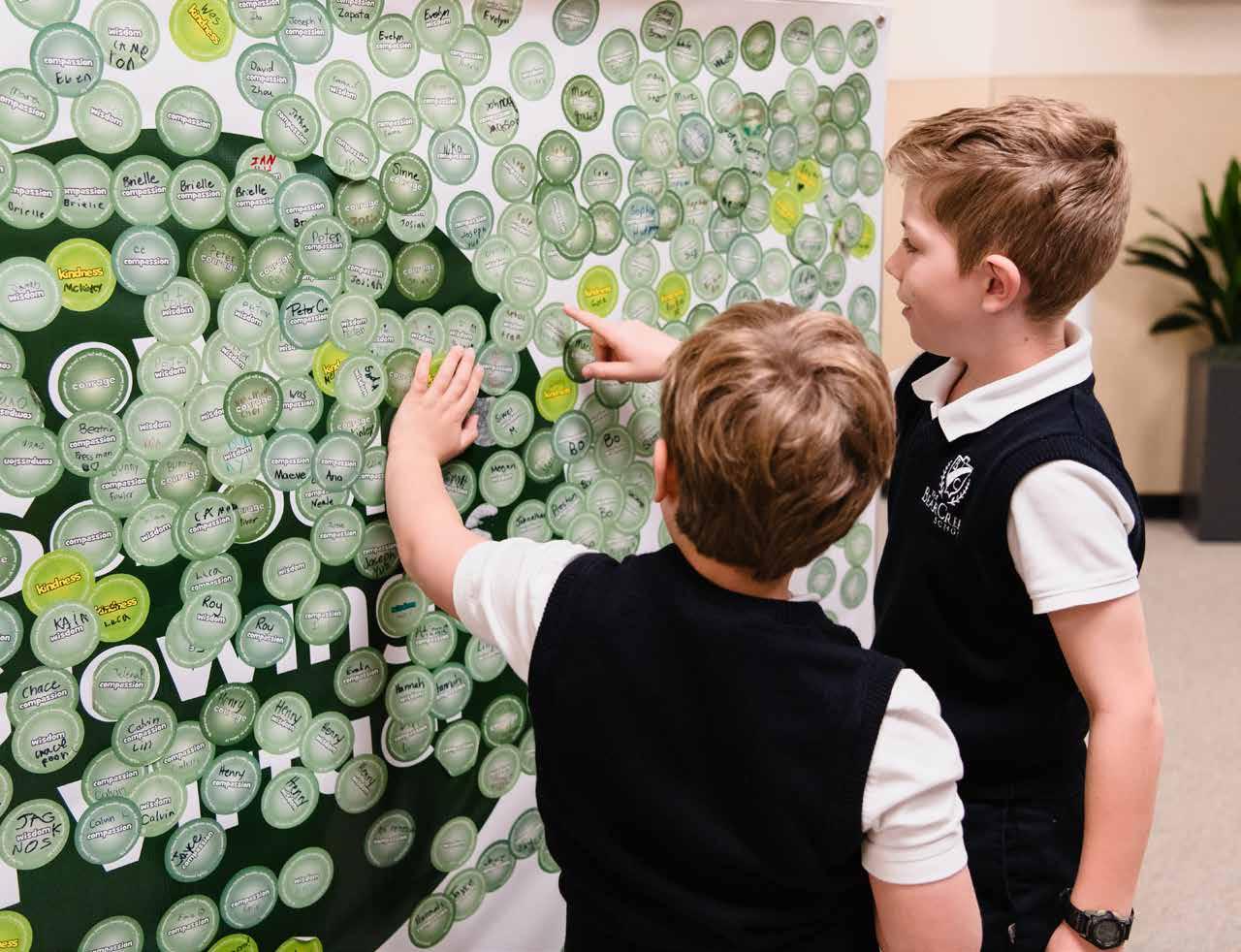 BY TRACY WHITFIELD, LOWER SCHOOL DEAN OF STUDENTS
BY TRACY WHITFIELD, LOWER SCHOOL DEAN OF STUDENTS
How would you describe compassion to a sixyear-old? Would you start with teaching him to think about others and how to put them first? Or is the goal that she use kind words? Maybe the focus should be on how we show consideration in our actions?
In the grammar stage, we teach our students what compassion means and repeatedly highlight how it can be demonstrated in their daily lives. After all,
the grammar stage is about repetition and having knowledge become so familiar it feels automatic and second nature. Every day we help to show our students that their thoughts, words, and actions can reflect what is good, true, and beautiful.
We see our Lower School students demonstrating their understanding of compassion in action on a daily basis. For example, when a boy in grade 2 offers to walk his classmate to the nurse’s office
because he wants to make sure she is all right, he is later heard telling the classroom assistant, “I would have walked her there even if she wasn’t my friend.” Or it is when a grade 4 student sees his classmate struggling to socialize with peers, so he goes out of his way to ask what activity his classmate wants to play and joins him. The teachers see compassion in their students as they encourage their classmates who may be nervous or anxious before presentations. The students are so encouraging and celebrate when their peers overcome a challenge.
We are intentional about witnessing and celebrating when our Lower School students demonstrate compassion. Our faculty and staff are always watching for students who show wisdom, compassion, or courage. When a student demonstrates these virtues, they are given a sticker with the virtue listed on it. The adult celebrates with the student, highlighting that his or her actions were good, true, or beautiful. The student then writes his or her name on the sticker and gets to put it on our “Wisdom, Compassion, and Courage” banner that is displayed in the Lower School hallway. It is beautiful to watch our students light up when they are given a sticker and then when they show their friends where their stickers are on the banner. These conversations among classmates are another learning opportunity and celebration, as our students are examples for one another.
Another wonderful way we celebrate the virtues that God calls us to is through our Growing in Virtue awards each week at Chapel. Our Lower School teachers select students who demonstrate compassion or other virtues like wisdom, courage, discernment, encouragement, and so many more. Each week, two students are publicly celebrated by the whole Lower School for the virtues that they
display. The teachers write an explanation of how the students demonstrate the virtues and how they bless our school. We desire to celebrate each student as he or she grows and learns from these virtues and to show all the Lower School students how they can learn from their peers.
Highlighting the virtues and gifts that God gives each individual becomes a regular occurrence and habit for our students. We see that the more we highlight virtues, the more it becomes natural for our students to identify the virtues, including compassion, in their peers and therefore celebrate them in one another. For example, when it is a student’s birthday, the whole class celebrates who he or she is as an individual and the gifts and virtues that God has given him or her. Teachers will take about five minutes on each student’s birthday to have the class share the virtues and character qualities the birthday student displays. The teacher writes them all down for the birthday student, and those birthday cards become beautiful keepsakes and reminders of how God uses each student.
Bear Creek’s mission statement highlights our aim to be a school with a nurturing environment that enables each student to become the individual that God intends. This statement is a great reminder for the adults who guide students daily, but it is also a truth that is shown each day to our students. The adults demonstrating our conviction that each student is a unique child of God that He created speaks volumes. They hear that it is okay to be different, and our differences come together to create the body of Christ, each with our own unique gifts and abilities. Through the repetition of hearing this and seeing this lived out, our students gain a deeper understanding of how our uniqueness is an opportunity to show compassion and care for one another.
“Bearing with one another, and forgiving one another, if anyone has a complaint against another; even as Christ forgave you, so you also must do. But above all these things put on love, which is the bond of perfection.”
– Colossians 3:13
At Bear Creek, our mission is to help students embody the teachings of Christ and become well-rounded individuals. We believe that true success and happiness come not only from academic achievements but also from having a heart transformed by compassion, love, and a genuine care for others.
Middle School can be a challenging time for students to exercise compassion. During this phase, they often focus on introspection and the need to feel secure and comfortable in their own skin, making it difficult to look beyond themselves. Embracing their unique qualities and showing empathy towards those who are different are their own challenges. However, it is precisely during this period that I see students have a great capacity for compassion. Understanding these developmental factors allows us to approach compassion-building strategies with empathy and understanding.
When middle schoolers demonstrate compassion, it frequently translates into acts of service. For instance, they willingly clean up after others, sparing someone else from having to do it. Driven by empathy and compassion, they often take responsibility for tasks that are not their own, motivated by a genuine desire to help others. Particularly, our seventh- and eighth-grade students excel in compassion within their relationships. When they notice a friend feeling down, they are eager and quick to offer comfort, reassurance, kindness, and hugs.
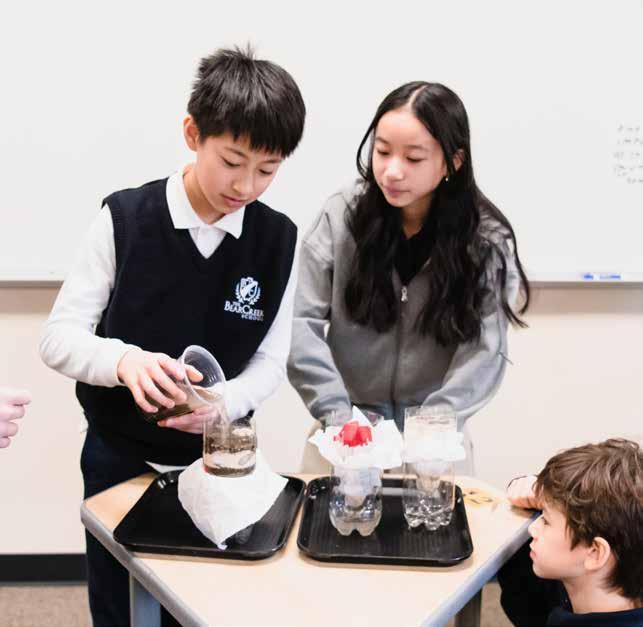
Middle School students actively seek opportunities for back-and-forth engagement. They are hands-on, exploratory in nature, and eager to figure things out for themselves. We give students opportunities to utilize their innate curiosity and emotional depth to connect with and understand the struggles and joys of others. One of our initiatives involves
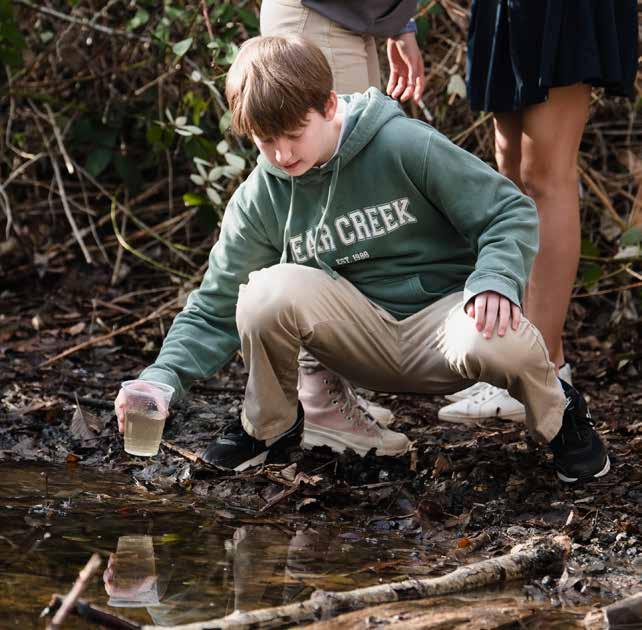
a partnership with World Vision, focusing on impoverished communities lacking clean drinking water. Middle School students are challenged to create water filters using available materials and dirty rainwater, learning about the importance of clean water and the challenges faced by communities in need. Prior conversations about real needs and actual people help students feel, relate, and identify with those in need before discussing solutions. This project not only develops critical thinking and problem-solving skills but also fosters empathy through meaningful conversations and compassionate actions.

Compassion in service extends beyond material possessions; it involves investing time, energy, and creativity in helping others. For instance, during our annual Hopelink food drive, students actively participate by purchasing items for donation. They also use their creativity to create gift bags for Hopelink shoppers during Thanksgiving and Christmas, emphasizing thoughtful gestures and dedicating time to brighten someone’s day.
We are intentional with recognizing and celebrating the virtues we see displayed in our Middle School students. As humans created in the image of God, it
is true that we all naturally have a deep longing for what is good, true, and beautiful. By recognizing and celebrating our students for their acts of compassion, integrity, humility, and love, we affirm the way God made them and aim to encourage their selfperception, identity, and character.
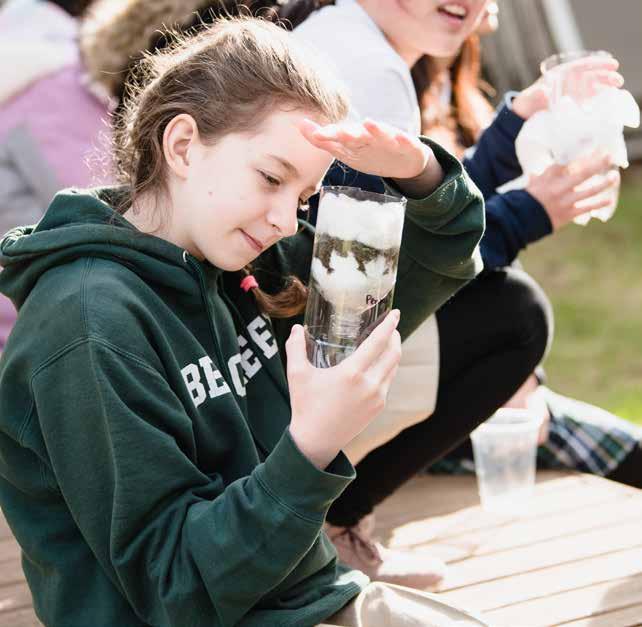
We have observed that students in fifth and sixth grades thrive when they receive public recognition. Special events like Bear Creek Leads provide opportunities for presenting character awards, highlighting and applauding virtues we see growing in them. By publicly celebrating these virtues, we reinforce their significance and inspire others to follow.
For students in grades 7 and 8, we understand that private acknowledgement may be more appreciated. Whenever I encounter a student who goes above and beyond the ordinary, I make a point to personally acknowledge and affirm that virtue to him or her. I may send an email to his or her parents, thanking them for raising such an exceptional student. We want students to feel seen and to know how much we appreciate their effort. When students witness their own growth and the development of virtues within themselves, they become more aware of their
capacity to positively impact their school.
By acknowledging and celebrating acts of compassion, integrity, humility, and love, we cultivate a habit of honoring truth, beauty, and goodness in God’s world. We want to communicate that these virtues are not merely optional or extraneous, but essential aspects of their being, as created in God’s image. This practice fosters a sense of unity in our school community and shows that compassion is not a solitary pursuit but a shared journey.
Our philosophy of virtue draws wisdom from Colossians 3:12: “Therefore, as God’s chosen people, holy and dearly loved, clothe yourselves with compassion, kindness, humility, gentleness, and patience.” This powerful verse serves as a guiding light for our educational approach. We strive to create an environment in which students are encouraged to embody these virtues in their daily lives. Compassion allows them to empathize with others and extend a helping hand to those in need. Kindness fosters a culture of respect, acceptance, and inclusivity. Humility teaches them to be modest and acknowledge their strengths while valuing the contributions of others. Gentleness emphasizes the importance of treating others with tenderness and sensitivity. Patience enables them to persevere through challenges and setbacks, demonstrating resilience and determination.
At Bear Creek, we understand that these virtues are not just admirable qualities but essential building blocks for a meaningful and successful life. By instilling Christ-like compassion in our Middle School students, we aim to cultivate a community of caring individuals who will positively impact the world around them. It is through the integration of academic excellence and character development that we believe our students will truly become wellrounded individuals, ready to face the challenges of the future with wisdom, compassion, courage, perseverance, and diligence.

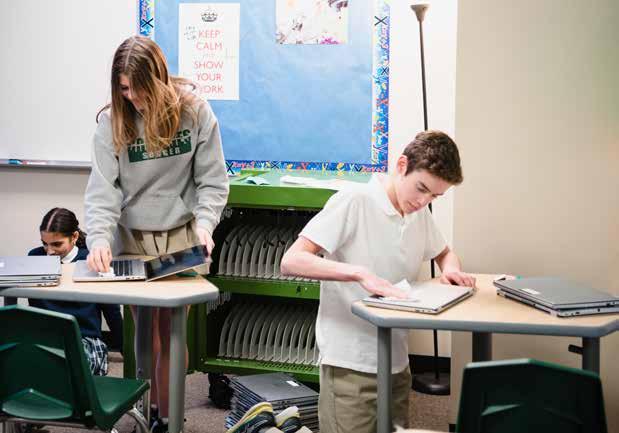
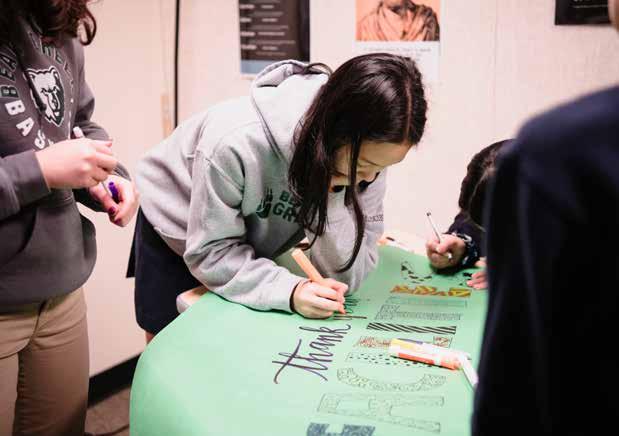
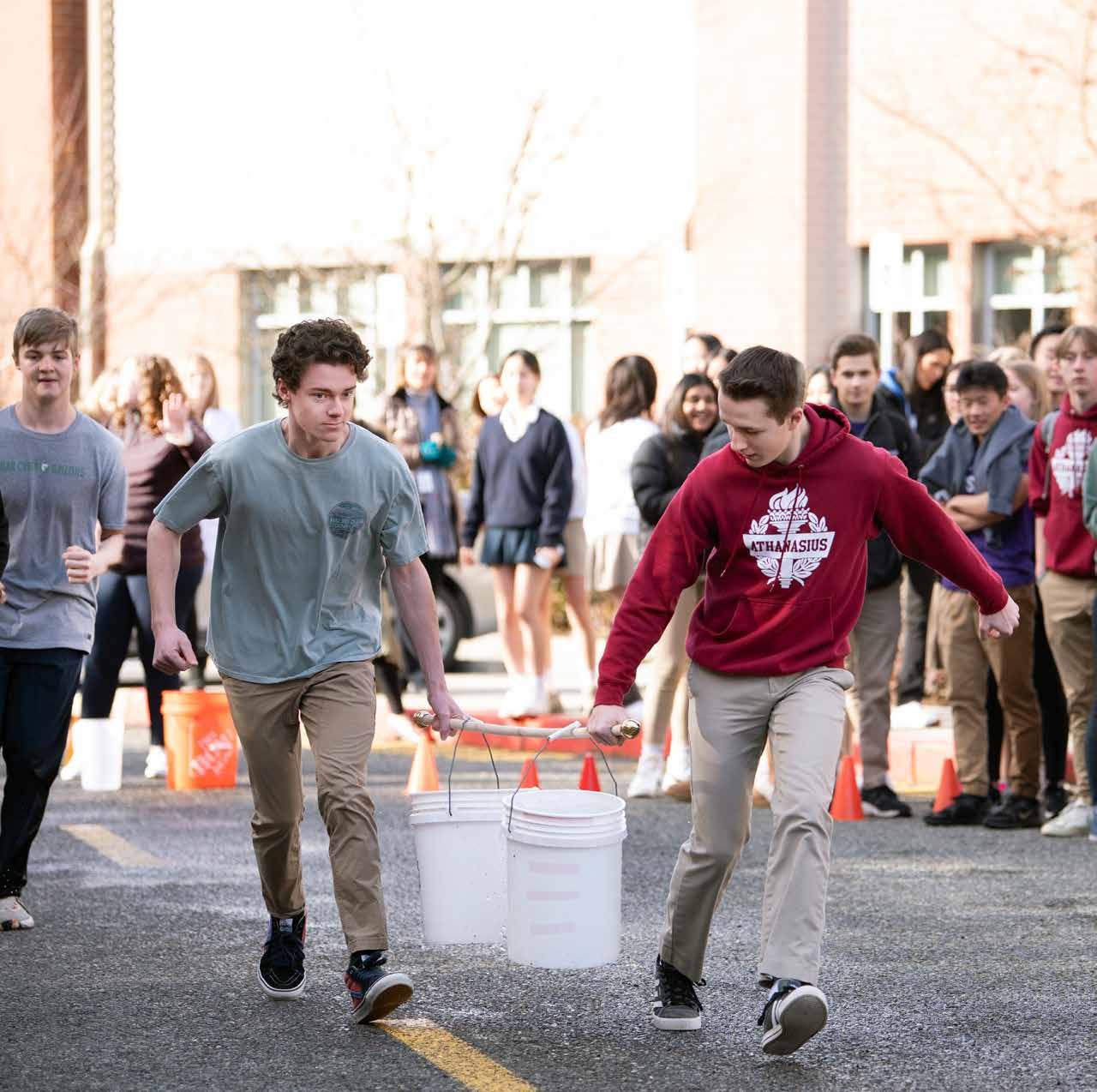 BY DAVE URBAN, UPPER SCHOOL ASSOCIATE DEAN OF STUDENTS
BY DAVE URBAN, UPPER SCHOOL ASSOCIATE DEAN OF STUDENTS
“HOPE” as “the feeling that what is wanted can be had or that events will turn out for the best.” In other words, wishful thinking. I hope it doesn’t rain today. I hope I do well on that test. I hope the Mariners win the World Series (okay, that last one’s more of a fantasy than a hope, but you get the point).
Fortunately for us, that’s not how the Bible defines hope. The hope we have described for us in scripture is a confidence, an assurance, of who God is, what He has done for us, and what He will continue to do in and through us as we put our trust in Jesus Christ. “Now faith is confidence in what we hope for and assurance about what we do not see.” (Hebrews 11:1, NIV)
That kind of hope changes everything, and when people experience it for themselves, they can’t help but pass it on to others. That’s what Hope Week at Bear Creek is all about—reflecting on the hope of salvation and new life offered to all of us through the Gospel of Jesus Christ and sharing that hope with others. Every year for a week in early February, each Bear Creek academic division finds ways to embrace both aspects of Hope Week through special chapels, assemblies, reflective activities, service projects, and fundraising for those in need in other parts of the world. It is a powerful experience for students and faculty alike.
But for students in the Upper School, Hope Week is not simply something we ask them to participate in, but rather something we ask them to take the lead on . This is because we know the impact that a special week like this has on them will be exponentially greater when they take ownership of the planning and execution thereof. And if there’s one thing we desire all of our students to be deeply impacted by, it is the reality of the Gospel and the truth of God’s love.
This past year’s Hope Week celebration was planned by our ASB’s Faith Committee under the leadership of committee head Grace Cheung. When I first met Grace during her sophomore year, she was a gentle, soft-spoken member of that same committee who told me she just wanted to obey God in her life, whatever that might look like. When that year’s Faith Committee Head Mariana Combariza told
Grace she thought she should apply for her position for the following year, Grace’s humble nature made her reluctant to do so but her love for Jesus and her fellow students compelled her to go for it and trust God for what would happen.
As God would have it, she has been selected to serve in that role for the last two years and during that time became one of the Upper School’s boldest and most outspoken student leaders.
I recently asked Grace to share with me some reflections on this past year’s Hope Week experience and her role in leading it—here is just some of what she had to share:
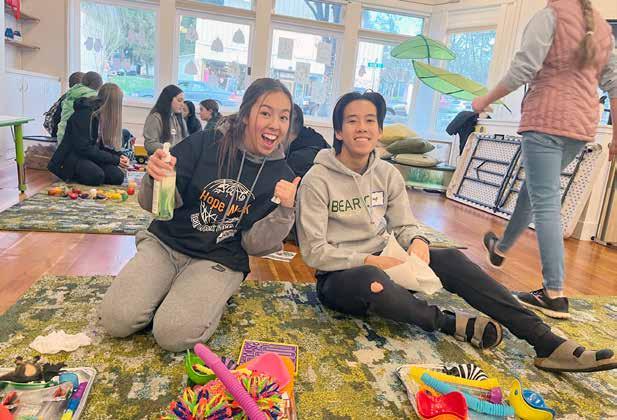
DAVE URBAN: How would you describe the purpose of Hope Week?
GRACE CHEUNG: The purpose of Hope Week is for students to develop and grow a passion and heart for the Kingdom of God. It’s really a week for us (however busy we may be) to pause and look at what God is doing in our community, in our region, and around the world while contributing to this Kingdom-building through service or through donating to World Vision.
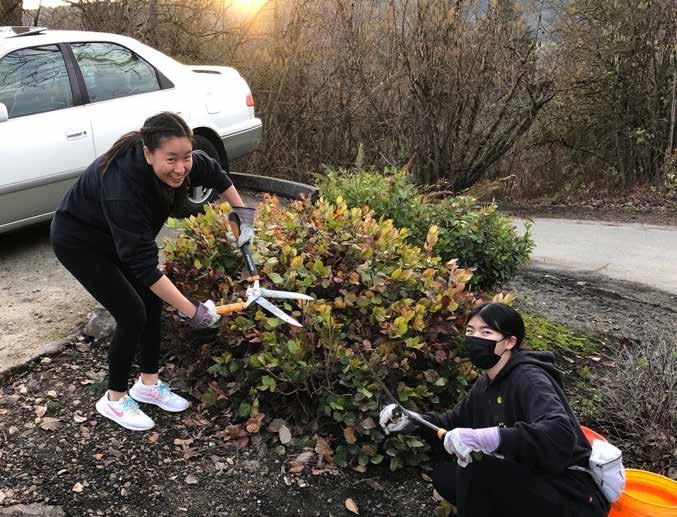
DAVE: What did it mean for you personally to be able to help plan and implement Hope Week activities as an Upper School student leader?
GRACE: Not many people know how much influence an Upper School student leader has.
While I was nervous about vision casting, planning a whole week of activities, and coordinating service opportunities after school, I was amazed by how everything came together at the end. People enjoyed the Hope Week assembly, chapel, water-themed Viking Games challenge, and more than twice the number the people we were expecting showed up to both service events after school! It was also mindblowing to see Lower School and Middle School students wearing the Hope Week shirt designed by ASB with the verse my committee and I had picked out! Seeing our community come together to serve was definitely a highlight of my high school career.
The two weeks before and during Hope Week were probably two of the busiest and most stressful weeks of my life, but also one of the most meaningful leadership experiences I have ever had.
DAVE: What kind of impact do you feel Hope Week has made in our community these past few years?
GRACE: As students learn and grow more in their faith journeys, they start to think more about and seek out the ways in which God is working. Or, if they are not Christian yet, they are questioning or seeking “evidence” of God around them. For students who are still unsure, Hope Week is an avenue through which they might see God working for the first time in our community and beyond, and they get a chance to participate in it. For students who are looking to apply their faith, Hope Week provides tangible ways for them to serve and partner with
God. Ultimately, the goal is that we continue to seek out ways to tell people about our Creator and further His Kingdom even after Hope Week is over.
Not only do Grace’s reflections paint a beautiful picture of the work God is doing through Hope Week, but they also illustrate how Bear Creek students are empowered to lead the way in helping our community join God in what He is doing.
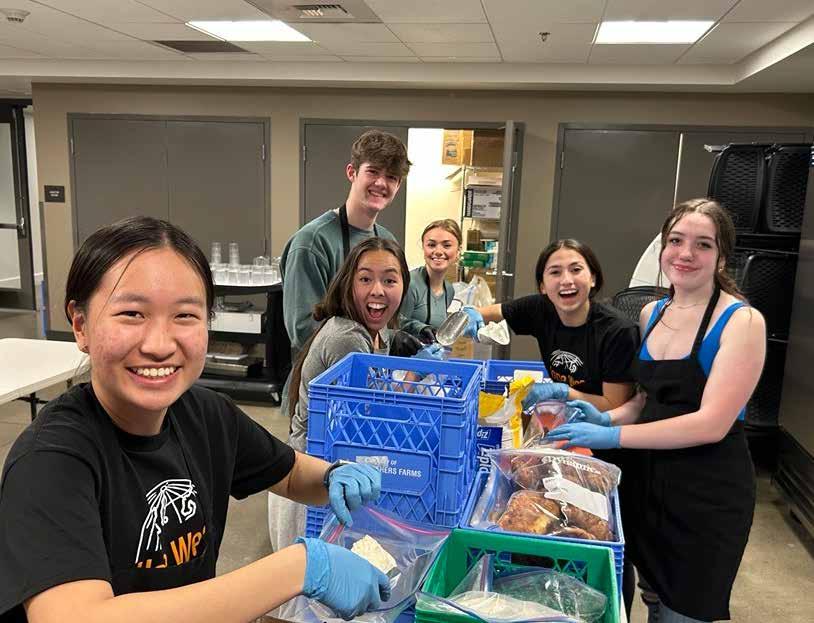
Hope Week is a great reminder for our entire community that not only has God poured out His love and hope for us through His son Jesus Christ, but He calls us to go and share that same love and hope with others, both here at Bear Creek and to the very ends of the earth. It also just happens to be a reminder that God is raising up a new generation of leaders like Grace to continue to spread that message of hope for many years to come.
In May, Bear Creek was honored once again by readers of 425 Magazine as the Best of 425 in the Best Private High School category, and kindergarten teacher Jenny Shimada was again voted Best Teacher. These honors reflect on all our faculty and staff and their talent and commitment to delivering on our mission. This is the sixth year in a row that Bear Creek’s families have voted us “Best Of” in one or more of the education categories.

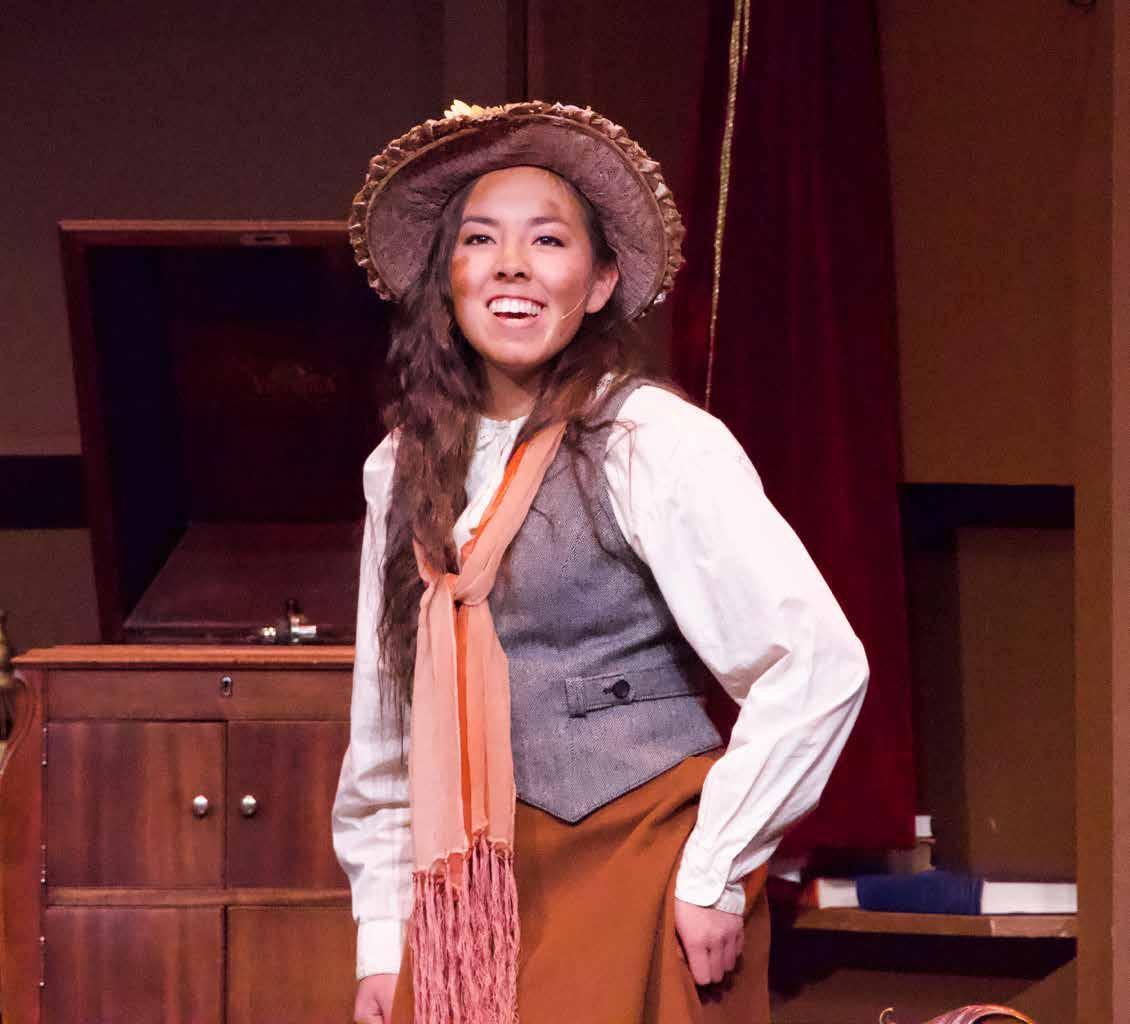



The Bear Creek School’s choir, band, and theater departments work together to produce a musical every four years. Our performing arts directors and students tackled the logistics of preparing for this year’s performance head on. With 34 cast members, 39 musicians in the orchestra, 6 of whom were also cast members, as well as 14 students in the tech crew, this 81-student production provided the Bear Creek community with an unforgettable experience that will be remembered fondly for years to come.
My Fair Lady is a musical adapted from George Bernard Shaw’s play and Gabriel Pascal’s motion picture Pygmalion with the book and lyrics by Alan Jay Lerner and music by Frederick Loewe. The story follows Eliza Doolittle, a young Cockney flower seller who takes speech lessons from Henry Higgins, a linguistic
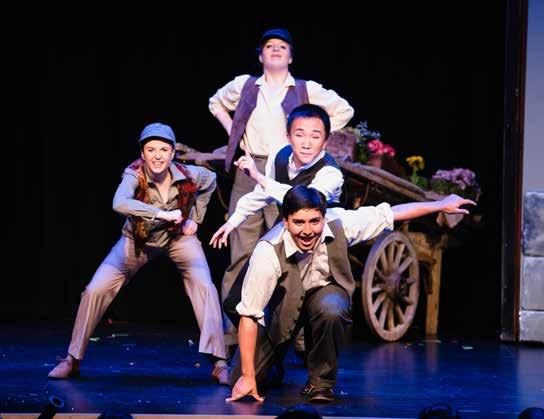
professor who is determined to transform Eliza into a “proper” woman. Throughout the course of the play, which is set in 1912, themes of perception and imposed identity transform the comedic story into a poignant reflection on our innate individuality and value.
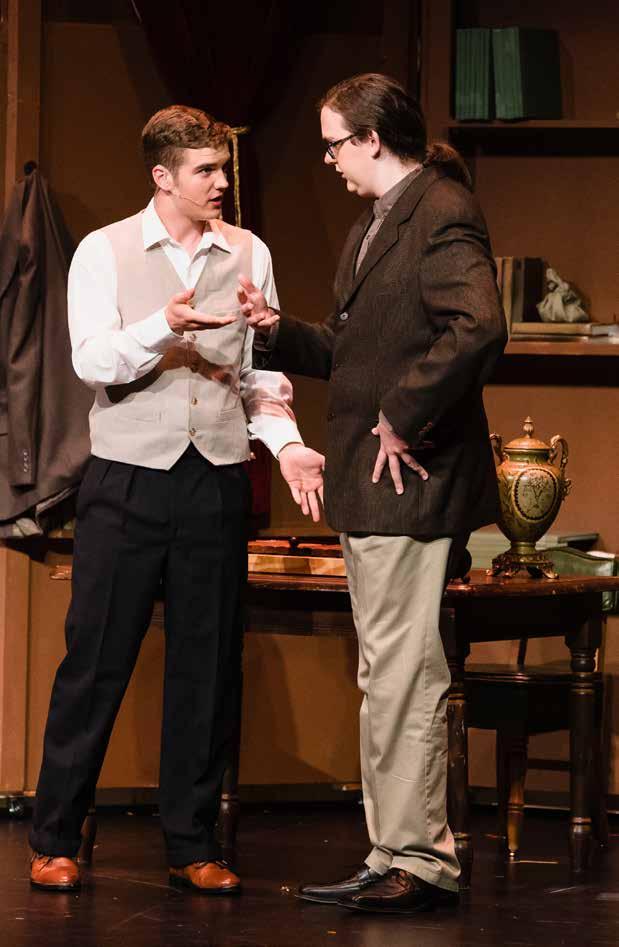
The My Fair Lady production was truly a feat of collaboration as band director Kelsey Thomson, choir director Emily Huston ’15, and theater director Jared Mack worked together to guide and support their students through learning, practicing, and finally, performing this sensational musical. Kelsey recalls that “as a production team, Mr. Mack, Ms. Huston, and I were really mindful that everything we did was in service to the story. We wanted to tell the story of value and human worth as creations in the image of God. All the music, all the choreography, and all the
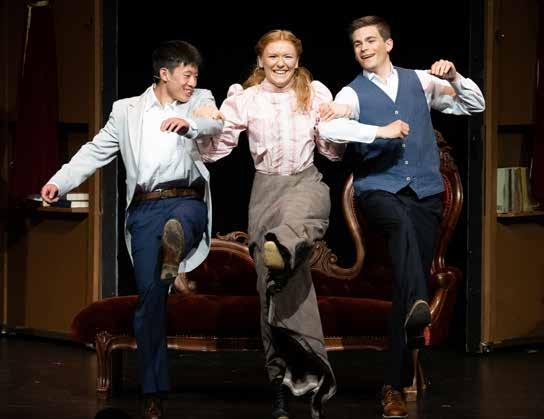
directors’ choices were to drive that narrative.”
While the students were led by experienced faculty and directors, they still faced many challenges as they learned unfamiliar musical pieces and memorized lines, cues, and choreography. Junior Benjamin S. states that “The biggest challenge I faced throughout the show was the difficulty of the music. I played first trumpet in the pit orchestra, and this music was some of the most challenging music I’ve ever played because it was written for professional musicians.” Additionally, performing with the pit orchestra differed from traditional Concert Band performances because “we had to learn to coordinate our playing with the cast, and we were not used to playing while actors acted and sang.” He reflects that the effort was very rewarding. “I
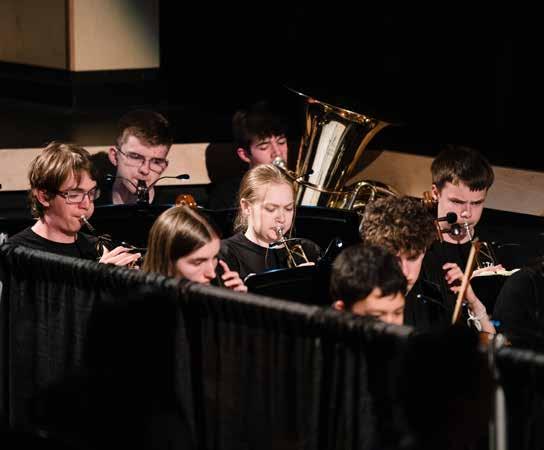
greatly enjoyed the challenge as it definitely made me a better musician.”
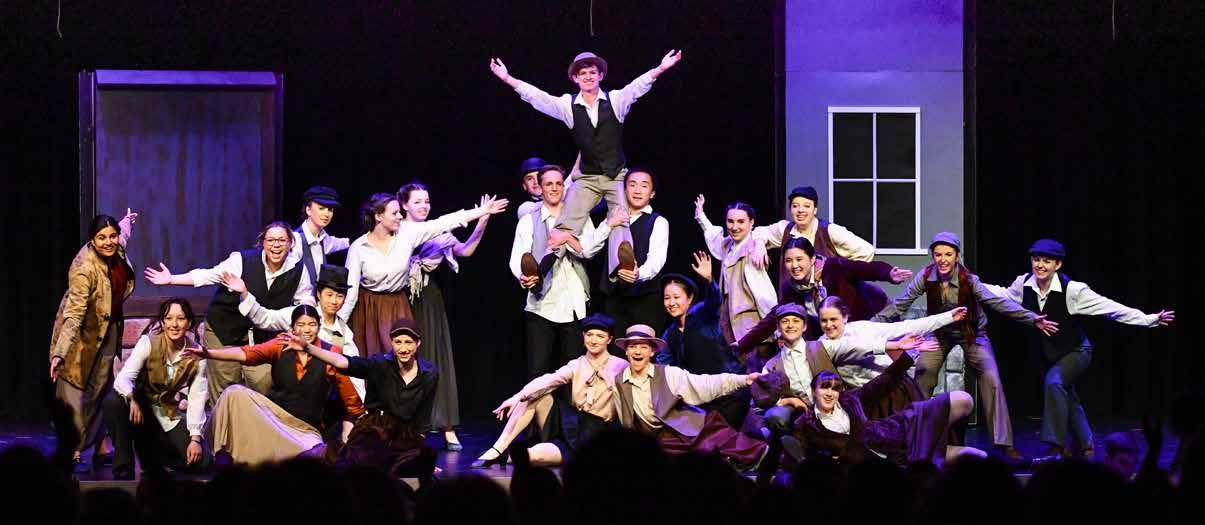
Despite the complexities of this performance, students rose to the occasion. Senior Ana P. offered a unique perspective as both an actress in the play and a member of the pit orchestra where she played the oboe and English horn when she was not on stage. She said, “The most rewarding part of the performance was seeing how far it came. As both a cast and pit member, I had a double perspective on progress, and I was overall really impressed with everyone’s work.” She continues, “When we started to run the show all together, I would listen to the pit while I danced thinking, ‘Wow, that’s incredibly close to the prerecorded tracks we’ve practiced with.’” And the
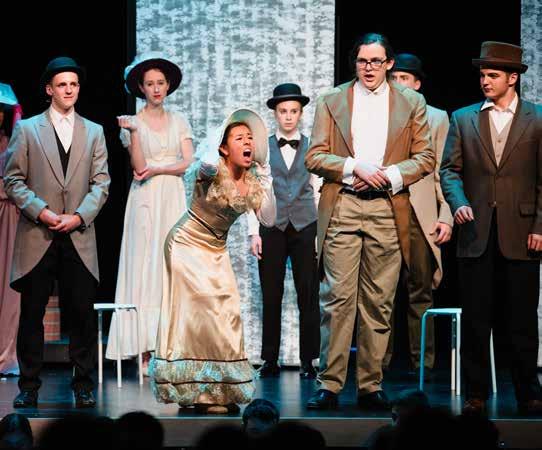
same goes for the performances when she was in the pit. “I got to a point where I could quote every line that was spoken before each song started. By closing night, it was extremely satisfying to see and hear how we all locked in.”
The intentionality of the directors created an environment in which collaboration and comradery thrived amongst the students. Freshman Lacey P., a member of the tech crew, noted that “the most rewarding part was seeing everything come together with minimal issues and getting to celebrate together afterwards.” Similarly, Benjamin states, “We were all very encouraging of each other and understood that it takes every single member of the band to make a great show. After each performance, we all gave ‘shout-
outs’ to one another in our pit orchestra Microsoft Teams channel. It was a very supportive and inclusive environment.”
The hard work of the directors, actors, musicians, choreographers, technical crew, parents, and volunteers made this story of human value and identity come to life in a profound way. Emily Huston eloquently notes that “it was truly a gift to work hard with others to craft and share a meaningful story as a way of serving the Lord and giving it as a gift to our audiences.” As we reminisce on the impact that the My Fair Lady performances made in our school, we look forward to our next Bear Creek musical production and all the experiences that it will bring to our community.
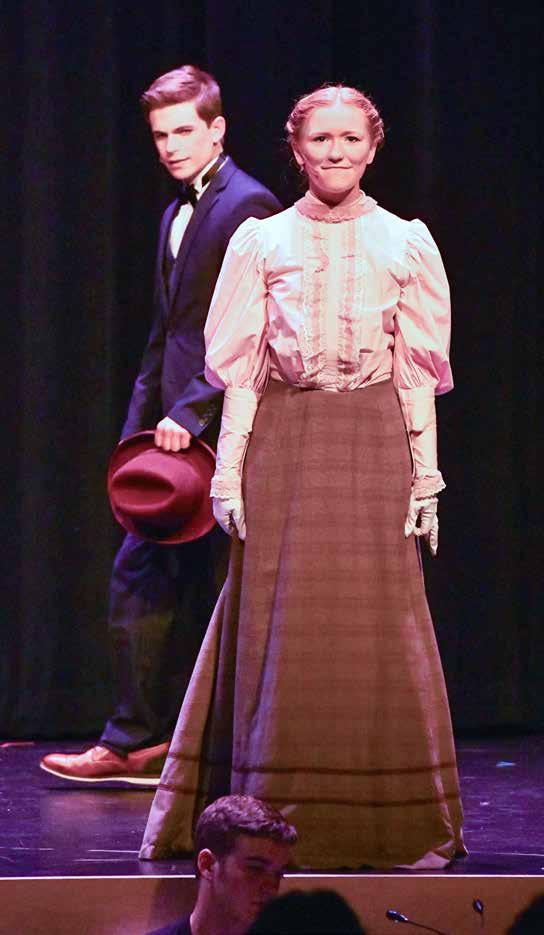
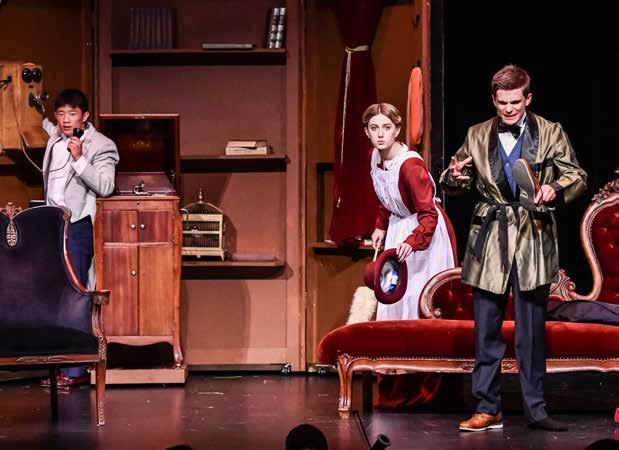
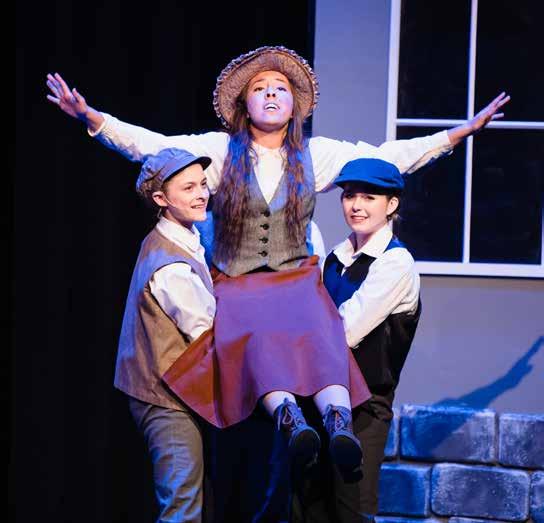
Upon completion of classes in mid-May, seniors spend three weeks intensively working on a personally selected project to demonstrate their ability to integrate a Christian worldview within an area of personal passion. The project culminates in a presentation to peers and a defense of the work before a faculty panel. The following Class of 2023 presentations were recognized with Honors distinction.
MORGAN ABBOTT chose to explore the divisions within Christianity, visiting many different churches and preparing an analytical brochure to help people understand the differences between denominations. We were impressed by her clear heart for Christian unity and her willingness to experience new and often uncomfortable forms of Christian worship.
SAM BIEBER transformed the mundane task of physical labor (i.e., yard work projects) into a sacred mission of financial support for an orphanage in Tanzania. Sam raised thousands of dollars, but his project was about more than just money donated. Sam will travel to Tanzania this summer to work at the orphanage, knowing that he seeks to bless, but also seeks to be blessed by those he is passionate about helping. Sam has clearly shown that he seeks to live a life of servant leadership.
GRACE CHEUNG’S project stems from her work with Bear Creek’s Chapel and mentor group program and her observation that sometimes mentor groups could use short, accessible devotionals. She
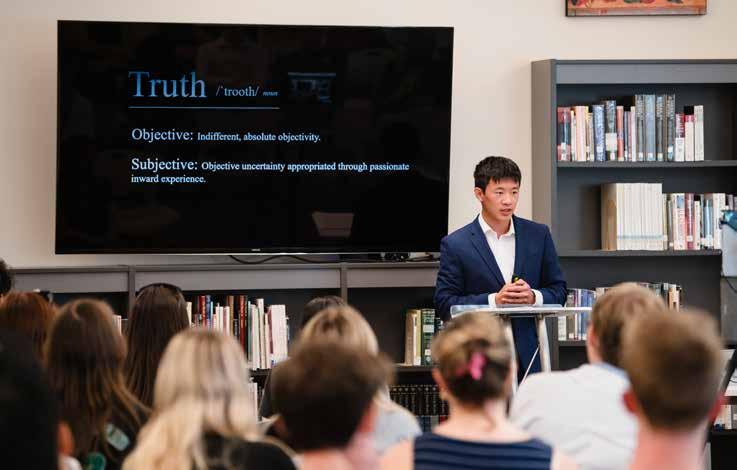
interviewed students and teachers and used the stories they shared to develop a brilliant book of studentfocused devotionals ideal for use in our mentor groups.
HANNAH CHINN started with the community she experienced as a member of Bear Creek’s cross country team. She mapped out and developed a practice course on Bear Creek’s campus that can now be used by the team, and she hosted a fun run for Bear Creek fifth-grade students that succeeded beyond her wildest expectations.
LIZZIE HUTCHINGS embarked to learn American Sign Language (ASL). This wasn’t about herself though, it was altruistically meant to bless others, and that she did! She thought intentionally about her family and church community’s need of ASL interpreters for worship. She beautifully mediated music through sign language to an audience that desires to worship. This project was both ambitious and well planned, and it authentically revealed Lizzie’s heart to care for others in a sacrificial and substantive gospel-driven way.
SOPHIE KOSTED not only tackled running a marathon, but she set the standard for what we want to see from future sports-related projects. She turned a grueling task of preparation into a spiritual journey of self-discovery in Christ, bodily health, and mental wholeness. The devotional she leaves behind guides other athletes to chase after the Son and to pursue Christ in the physical aspects of their lives as well.
ZACH MIYAZAKI went into his project looking for truth by comparing religions with the hope of leaving behind a legacy for our grade 12 Christian studies class. In the process, he wrestled with how to live in relationship with others from truly different walks of life while building his understanding of the importance of conviction and the willingness to hold firm to truth.
ROSALIND NORDBERG’S project seems simple—she cut a new trail through the wilderness at her family’s cabin. But it was so much more than that. She built the trail as a devotional walk that explored how God reveals Himself to us in nature, and she invited family and friends to experience God through her project.
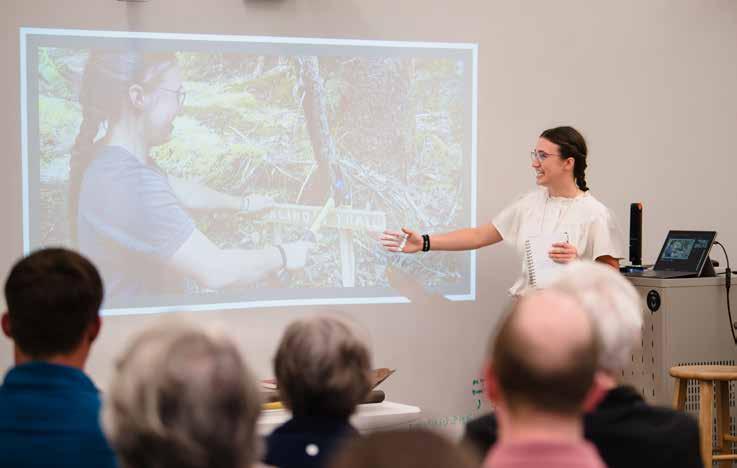
CALEB O’GARA has a passion for the weather. Caleb spent his project weeks chasing storms through the Midwest and creating beautiful time-lapse videos of extreme weather events. But what really put it over the top was his connection of his passion for the weather with God’s creation and with human community.
WILL ROSU literally created a forge. Really. Will set out to learn
the art and science of blacksmithing and created a family heirloom in the form of a beautifully forged cross, symbolizing the love of God applied to his love for his parents. He gifted this cross to his parents, and no doubt it will be handed down in his family for generations. Will’s worldview metaphor of God as the omnibenevolent blacksmith, forging us in His image, is apropos and brilliant.
MIYA SHIMADA brought her audience to tears by exploring the Bear Creek experience from kindergarten to graduation. She partnered with the school’s marketing team to create a magazine capturing the journey of a student through each stage of our deliberate educational process, and through the journey, showed how God has transformed her into the individual He intends as she prepares to launch into a new adventure beyond this place.
GRACE SUN’S project was to compose and share beautiful music
that reflects her own story, which is still in process. Her explanation of her compositions left everyone in awe. The music was a journey in human emotion (and more) but attempting to explain it here does little justice. One must listen! This music is personal for Grace but is also a gift to others. It is simultaneously intrinsic and extrinsic in its quality, content, and impact.
CHLOE ZHENG’S project was about igniting imagination through the means of art, and what better person to do this than Chloe? She created a comprehensive art curriculum for Lower School students, and she taught lessons to the Bear Creek kindergartners. Chloe is a proclaimer of beauty and goodness and listening to her was, and is, inspirational. Dr. Sorensen notes, “She is simply one of the most creative persons I’ve ever met, and I pray that she continues to bless others with her God-given talents.”
 BY KATRINA THOMAS
BY KATRINA THOMAS
On the last day of preschool, between character awards for their daughter Naomi and preschool pick-up, Michael and Audrie Van Winden carved out time to reflect on their four years at The Bear Creek School. Sitting together over an Americano and almond milk latte, they quietly smiled at each other as if they were sharing their thoughts telepathically.
“It’s fun to revisit this journey,” said Audrie. “We’re spreadsheet people and on the surface, Bear Creek
seemed to have it all.” Their journey to Bear Creek started in 2017 when their oldest child, Luke, was a busy one-year-old. “We were the only parents at the Lower School and Preschool Open House events that year who attended for a one-year-old,” Michael laughed. “They probably thought we were funny bringing a one-year-old to a Lower School Open House, but we thought if we were going to be serious about private school, we should start early and wanted to make sure that preschool could
transition into an elementary school.”
After touring a half dozen other schools in the area, the only one they applied to was Bear Creek, and Luke joined the P3 class in 2019. “We really wanted a school that was going to reinforce the values that we were teaching at home. We want our kids to find their own faith, and we just really value a school that has a mission statement that is aligned with what we are doing,” said Michael.
Luke’s sister, Naomi, is following in his footsteps having just completed her P3 year and, according to her parents, would happily skip P5 to jump straight to kindergarten. “The children are known and loved. One of the most important things is having children who know Jesus, have a relationship with Him, and are strong in character,” Audrie explained.
Michael and Audrie wanted a community that was living out active faith, not just a message on the wall or something written in a pamphlet. Michael explains that “the investment the teachers have made in the kids lives and the communication with the parents” builds a strong bond of trust. To them, it is clear the teachers’ priority is being the heart of Christ and molding students to be leaders in the world.
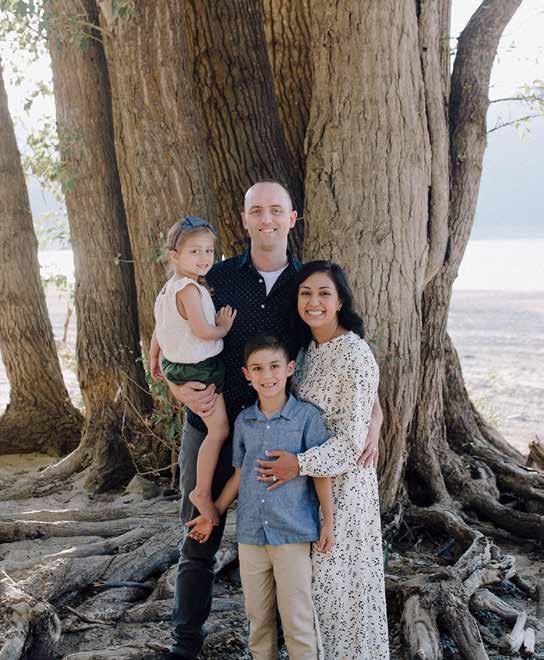
As their journey progressed throughout the pandemic and then back to something close to normalcy, they are grateful for the security that Bear Creek has provided for Luke.
“He felt safe and comfortable, confident that even on a new campus he was going to be seen,” said Audrie. Michael added, “There was a day when we were standing at the windows looking in because we couldn’t come inside, and we saw Luke and Mrs. Gratton skipping together down the hall. She was making him feel comfortable, and it was just this precious moment of life, him being welcomed in that way. It instantly set the tone for a beautiful year of kindergarten.”
Volunteering was a slow and steady growth process for their family, with commitments built out of
what was accessible to their family during changing times. “Our first year at Bear Creek was a split year of in-person and remote learning, and our youngest was an infant,” explained Audrie. “Our volunteering that year was limited, but in subsequent years we volunteered in ways that allowed us to be connected to our community and worked for our family such as providing weekly library books to the classroom, bringing baked goods for the PTF, remote mystery reader for the classroom, creating a classroom presentation on architecture and engineering, etc.”
With Naomi in P3 last year, they began to get more involved at both Redmond Campus and Valley Campus, including Audrie’s seat on the school’s Facilities Committee, on which she has been invited to serve because of her background in architecture. They love watching their children’s excitement when Michael or Audrie volunteer for reading stations or chaperone a field trip and would encourage anyone thinking about volunteering to start in a place that feels attainable. “There are so many opportunities for parents to be involved with
the school,” Michael expressed. “It makes me feel grateful to be a part of it. There’s not a disconnect between me and the school my kids attend. It goes to the root of why we’re here, because we want the school to be a partner with us and the church.”
Supporting the school with donations became an easy choice because of the mission statement and decisions by the Board of Trustees. The Van Windens believe that generosity fosters stewardship of future generations and needs to be sacrificial. “The school is doing kingdom work,” said Michael. “Our first gift was made of the desire to truly be invested in our school community and further the mission. In the same way we invest in our church community, it was important for us to be invested in a community that is an extension of our family and faith.”
He went on to say that they hold nothing back, giving out of gratitude and making it a priority to be involved. “We’re setting that example for our children. It makes a difference. Our hope would be that the Lord would use our small contributions to continue to foster future generations that love and serve the Lord. Both indirectly and directly, these philanthropic efforts would empower the next generation to carry the call for future generations.” Audrie added that generosity is an echo of real versus ideal parenting. “We’re all striving for the ideal, but it might not be realistic. Giving should be something that’s second nature, actively living out life for Christ. It is a beautiful opportunity to make a difference and contribute to something.”
The Van Windens are living out their words at church as well. They started a small group at Timberlake Church to give their children another opportunity to be surrounded by trusted adults as well as build support around themselves as a couple. “We started this group, and it turns out that half are Bear Creek families as well,” Michael said with surprise. “We found each other through church and are living life together in community at school, at church, and at home. The demands of life and work make it easy to miss connections,
but we’ve tried really hard to build a community. If you read Acts, they were always together. It’s a beautiful and necessary thing. I love that Bear Creek continues to grow and foster community.”
Michael and Audrie feel tethered to Bear Creek, knowing that God has laid out His plans for their family at the school. They encourage other parents to join them on their journey by diving into the Bear Creek community. “If you want a group of imperfect people working together perfectly, it’s here,” said Audrie. “It’s astonishing what can be accomplished together.”
Legacy giving is a powerful way to make an impact on tomorrow’s world through the education of future Christian leaders— individuals prepared to engage the world with wisdom, compassion, and courage. Your thoughtful planning to advance the mission of The Bear Creek School will make a difference in the world your children, grandchildren, or even great-grandchildren will inherit.
If you have already made a provision for The Bear Creek School in your will or estate plan, please let us know so we may say thank you and recognize your generosity by welcoming you into our Legacy Circle of like-minded donors.
For more information about making a legacy gift in your will or through life insurance, property, or other assets, contact Mariana Keller, Vice President for Philanthropy and Community Engagement, at mkeller@tbcs.org or 425-898-1720 ext. 340.
The Gooden family was part of the Bear Creek community for five years, from 2018 – 2023, but the impact that Jennifer Gooden made while serving as a Parent Rep and on the PTF Board will be remembered for years to come. We had a chance to catch up with her before the family relocated to North Carolina over the summer.
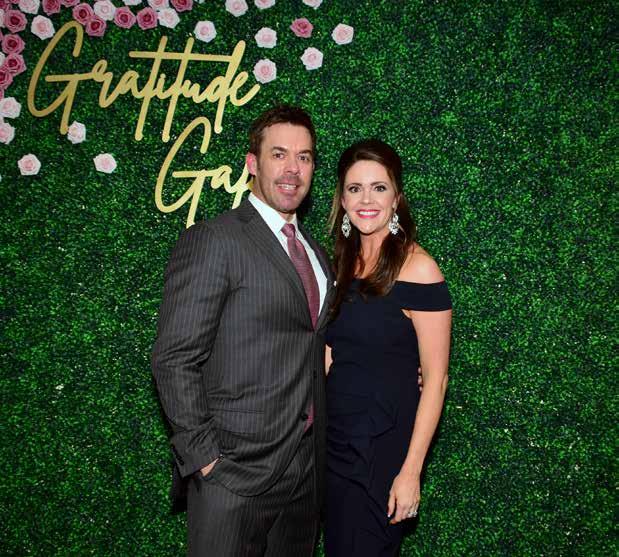
Tell us why you chose to invest your time and talents with Bear Creek.
One of the greatest gifts I can give my children is the example of servant-hearted leadership. When my children see me serve, they not only see a reflection of who God calls us to be, but also the understanding that I see great worth in investing my time into their school.
During our first year at Bear Creek, my daughter’s P3 teacher asked if I would be interested in serving as her room parent. I wasn’t sure I knew how to do that well, but she was so supportive and encouraging that I agreed to do so. I loved being involved with our class at a higher level. I knew this was the way I wanted to serve and was a room parent during our five years at Bear Creek. It also became the catalyst for me to step into more volunteer roles. At the end of my first year as a room parent, I met Karen Firminger who asked me to be a Parent Rep for the next school year. I was then asked to join the PTF
Board the following year.
You led PTF so beautifully, how was the experience of serving in a leadership role?
There have been times in my life when God has surprised me with leadership roles I wasn’t expecting. Serving as the PTF President wasn’t in my plans but was certainly in God’s plans. When I look back at the years serving in this role, I have the most beautiful memories; it was such a rich experience. PTF has given me opportunities to enhance the experience of our students and community. It’s an immense amount of trust, and I’m humbled to be entrusted with something that holds so much influence in our community. Seeing first-hand the impact that PTF events have on our teachers, staff, students, and families exemplifies the immense reward of servant leadership. I am incredibly thankful for this experience.
If I could consolidate my appreciation for Bear Creek, it would be for the intentionality of community. I have loved every aspect of the community events and relational experiences that Bear Creek gave to our entire family and thank God for giving us this season in our lives.
50% more
opportunities to spend time with a favorite teacher, coach, or class friends with
Unique to Bear Creek experiences.
wu
wu wu wu 2023 Gratitude Gala

535 participants An amazing committee
w
5 of
501 max bids made q
volunteers helped make the 2023 Gratitude Gala a success!
Because of you, our libraries encourage the love of reading, build literacy, foster innovation, support teachers, and engage student voices
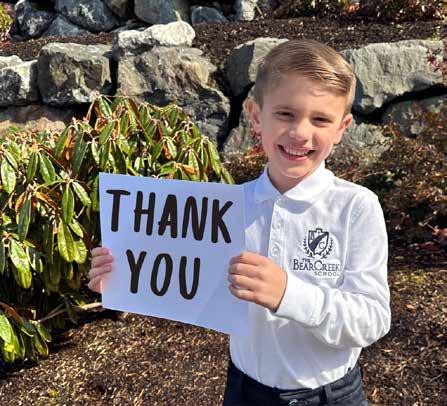
Together, we transformed our libraries into warm, welcoming environments with resources and tools for learning, inspiring, cultivating, and strengthening minds


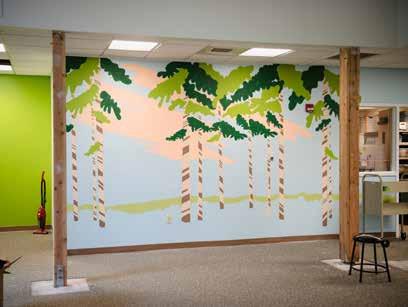
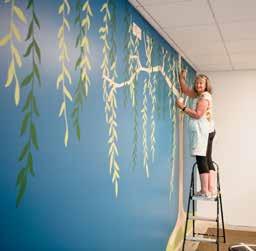
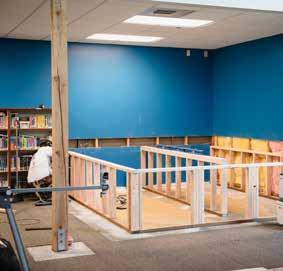

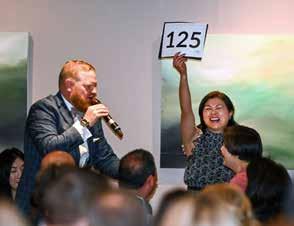
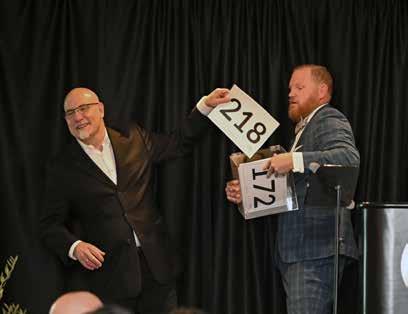
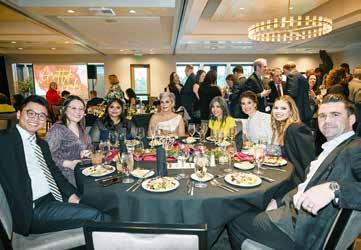
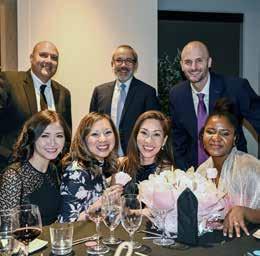

Kathryn is an alumna who embarked on a transformative journey after graduating from Bear Creek. Pursuing her studies at Pepperdine University in Southern California, Kathryn delved into the areas of sustainability and psychology through her double major. As she reached the end of her studies, Kathryn reflected on her enriching experiences, including her participation in the Young Evangelicals for Climate Action Fellowship. Through this year-long fellowship, she received training in advocacy and creation care, empowering her to spearhead her own projects focused on water conservation. Kathryn’s involvement in a municipal water district and her leadership in educating the public about purified recycled water further highlight her commitment to sustainable behavior change. Her inspiring story highlights the impact one individual can have in shaping a more sustainable future.
Kathryn says her involvement in the Eco Club at Bear Creek and her volunteer work at the Seattle Aquarium sparked her interest in sustainability. This, along with the personal influences of her father, who was a research psychologist and a professor, inspired her to pursue an education in psychology and sustainability. She says that she was raised in the Bear Creek “bubble,” attending Bear Creek kindergarten through grade 12, and that her studies at Pepperdine have broadened her worldview and require her to “think less about my immediate location and more about the world overall.” In contrast, her psychology classes have unified her “understanding how we are all just humans and hardwired similarly.”
In her pursuit of knowledge in psychology and sustainability, Kathryn highlights one particular class that left an indelible impression on her: Climate
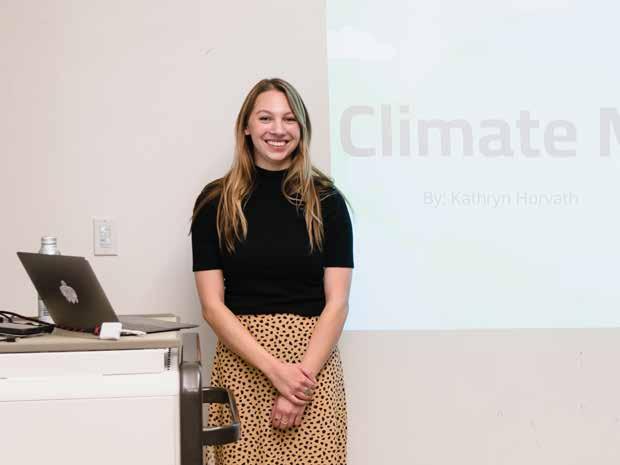
Migration. Recognizing the lack of awareness around this topic, Kathryn found an opportunity to return to Bear Creek and talk to AP Environmental Science and Marine Biology students about the realities of climate migration. Kathryn emphasizes the fact there is more hope than one may think in learning about the topic of climate change. Kathryn shares she has learned that the technology necessary to combat climate change already exists, dispelling the notion that we must wait for future technological advancements. Kathryn’s studies serve as a reminder that education and awareness can empower individuals to tackle climate challenges and embrace the tools at our disposal for a more sustainable future.
Kathryn’s profound belief in the intersection of faith and sustainability has been a driving force in her academic and fellowship experiences. Her fellowship, rooted in the principles of creation care, solidified her conviction that “humans have a unique symbiotic relationship with the natural world.” Understanding that caring for creation is an inherent responsibility, Kathryn emphasizes, “There is a delicate balance between human stewardship of the environment and the provision nature offers.” The joy she experiences in learning about the divine significance of creation serves as a constant reminder of the parallels and interdependence between humanity and the environment. For Kathryn, faith and sustainability are inseparable, guiding her actions and inspiring her to advocate for the care and preservation of the planet.
You may remember Sam Humphries from his work at Bear Creek starting the Eco Club, a club centered around sustainability. He continued demonstrating his leadership aptitude in service to our country. He was recently posted to his first duty station in Vicenza, Italy, as an infantry platoon leader where as a first lieutenant in the U.S. Army, he holds a significant responsibility to lead, motivate, and guide soldiers and plays a vital role in ensuring the overall success of his unit.
Sam graduated from Bear Creek in 2016 and attended the United States Military Academy, in West Point, NY. Admission to West Point is competitive, and Sam had to complete a two-stage admissions process. In addition to a regular college admissions, Sam had to be nominated by a congressperson and pass a fitness test. Sam describes West Point as a “typical college experience” with an “interposed military atmosphere.” At West Point, Sam received a B.S. Applied Mathematics and Counterterrorism. After West Point, he was accepted into a graduate program funded through a defense fellowship at MIT. This program is typically only offered to ten graduates. There he studied Operations Research where he continued to research climate change stating, “My research was mostly related to using analytics to solve different kinds of sustainability related problems.”

Bear Creek gave Sam an individualistic perspective on making an impact. However, the journey of military service has transformed Sam’s worldview even further. The army’s unwavering emphasis on people, their development, and their well-being has become an overriding priority for him. Over time, his initial immaturity regarding how to make a meaningful impact on the world has given way to a
profound realization: while global issues like poverty, world peace, and climate change deserve attention, it is through people that true progress is achieved and the most significant impact is made. The military’s inherent value for human life has instilled a profound change in perception, fundamentally altering the way Sam thinks about affecting change. Though personal concerns and causes remain, his priority now lies in caring for and prioritizing the people who matter most, including both loved ones and those who cross Sam’s path. Military service has not only broadened Sam’s horizons but has also revealed the extraordinary power of fostering genuine connections with others as the key to shaping a better world.
Sam reflects on how his educational background at Bear Creek has contributed to developing his own personal worldview. He emphasizes the importance of having the ability to think critically about his worldview—a skill that was nurtured at Bear Creek. Classes like Capstone, taught by Mr. Davison, played a pivotal role in shaping his critical thinking skills and worldview. Bear Creek not only equipped him with essential communication skills, but also taught him how to approach the world and seek out the necessary resources for informed decision-making. Sam believes these skills are invaluable as they have allowed him to tackle complex issues and inform his worldview through research and reflection. He recognizes that many people value exploring deep
questions but often struggle to find an entry point for learning. However, thanks to his education at Bear Creek, he feels prepared to engage with and think critically about his beliefs and values, setting a solid foundation for the journey into military service and beyond.
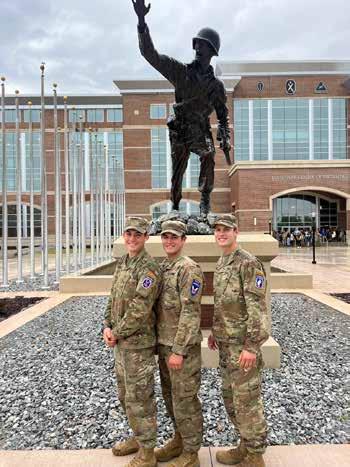
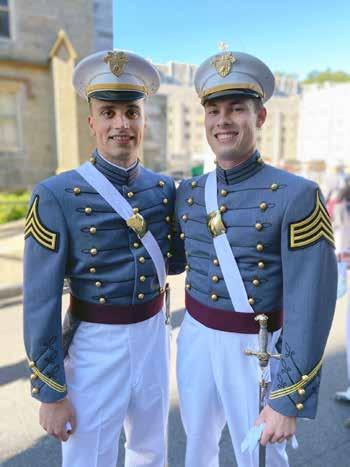
During his insightful interview, Sam emphasizes the significance of having a guiding purpose in overcoming challenges, both in the military and in life at large. He has always recognized the importance of anchoring his life around a central purpose, providing a consistent framework to lean on during difficult times. While careers and relationships may evolve and shift, he believes it is vital to have a purpose that transcends these transient aspects. For Sam, that purpose resides in his faith. His profound desire to seek truth and construct a life that aligns with that truth serve as a steadfast foundation. Sam states, “I want to discover what is true and build a life that honors that.” In the face of adversity, his unwavering commitment to his faith provides him with solace, strength, and clarity. His military journey has further reinforced the power of having a purpose beyond fleeting circumstances, showcasing
the transformative potential that lies in pursuing a life that honors one’s deeply held beliefs.
Sam’s experience after venturing from Bear Creek offers valuable insights and lessons. For those aspiring to attend a military academy, Sam advises focusing on developing people skills and leadership abilities as these are significant skills to possess in the military. While academic achievements hold their importance, Sam acknowledges that some of life’s happiest memories are made in the company of friends, for example, “going out to lunch my senior year.” Those moments with friends are fleeting in nature, so Sam urges others to take a step back from relentless grade pursuit to fully embrace and enjoy the present. Sam’s closing words serve as a reminder to prioritize connections and treasured experiences thus fostering a well-rounded and fulfilling journey both in and outside the military. Sam reflects, “Time isn’t necessarily something to be optimized, but it is something to be cherished. Making a positive impact on the people around you can be as simple as slowing down and smiling at someone you pass in the hall or talking to the kid that no one talks to.”
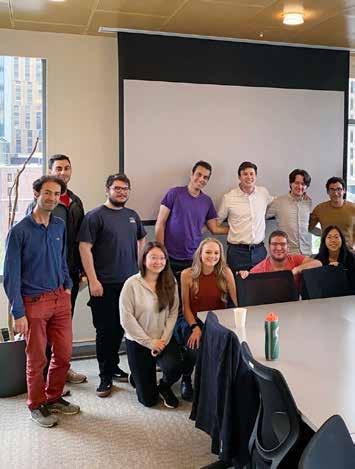
CLASS NOTES, STORIES, AND PHOTOS are now available online at alumni.tbcs.org. Updates may be submitted on our alumni site any time—no waiting for the next issue of Modus Vivendi.
We would love to have you join us this fall at one of our upcoming events. Watch your email and social media or check out alumni.tbcs.org for more details. If you are interested in helping plan or organize an event, or have any questions, please contact Mariana Keller, Vice President for Philanthropy and Community Engagement, at alumni@tbcs.org.
Wine Tasting and Gathering for Alumni (age 21+) and Parents of Alumni
Alexandria Nicole Cellars
October 6, 2023
Dig Pink Volleyball Matches
October 13, 2023
Green & White Night
November 21, 2023
Follow us on Instagram @BearCreekAlumni or request to join the Alumni or Parents of Alumni Facebook groups.
IN JUNE 2023, we wished a fond farewell to Bear Creek's longtime Director of Information Technology Veronica Mickelsen.
For over 24 years, Veronica placed the mission of The Bear Creek School and serving students above everything else, including herself. As the school grew during her tenure, she consistently looked for ways to move the IT department forward, continually striving to improve and innovate so students had the best learning environment possible. A memorable example of her tenacity and dedication was during the pandemic. This was new territory for the IT team and the school, and since instruction was initially remote, there was a need to revamp our software infrastructure to continue teaching. Veronica and her team delivered within two weeks. Once we came back to school in the fall of 2020, classrooms needed additional audio and visual hardware updates as well as new software to teach students at home and in the classroom at the same time. At each juncture, Veronica was quick to recommend and implement creative new resources so that students could continue learning and the mission would endure. Through her vision and personal sacrifice, Veronica leaves a significant legacy at The Bear Creek School, and we are forever grateful.
